UEA wins 9th consecutive Derby Day pg. 22-24

Chloe Smith MP on higher Venue:

Bodies in the fashion world

pg. 16




pg. 16
An emergency motion of ‘no confidence’ in the Executive Team passed in Union Council last week, holding “the current Executive Team responsible for the financial crisis” and moving for the UEA SU Student Officer team to “be involved in the decision-making process”. This comes amidst the £30 million deficit, concerns surrounding staff redundancies and union boycott action which may delay graduations.
The University and College Union (UCU) began this marking and assessment boycott on the 20th April, calling for all members from universities that are part of the pay and working conditions dispute to stop any summative marking and “associated assessment activities”, including the processing of marks. According to UCU, this boycott will “carry on until the disputes are settled, or UCU calls off the boycott, or at the end of the industrial action ballot mandate (usually six months after the...ballot closes)”. The re-ballot for pay and working conditions closed on the 31st March 2023, meaning the boycott could go on until the end of September- the start of the next academic year, and months after graduations are scheduled.
The chair of the UEA UCU branch, Michael Kyriacou, explained that the boycott is a result of “a variety of factors at play”, but that “the quickest way to ensure minimal disruption to students is for the UCEA, the body in which we are in dispute with, to table a better offer that UCU members will accept”. He also expressed his sympathy for students; “No staff member wants to disrupt their student’s education”, and explained this is “difficult action for any member of staff to undertake” but that “UCU needs to get a settlement that members deserve”. He concluded that it is his “firm hope that we [UCU] will have an offer from the employers that will enable us to resolve the dispute and make sure graduation and progression goes ahead unaffected”.
Concrete was also able to get a statement from Professor Emma Sutton-Pavil, Pro Vice-Chancellor for Student Experience and Education, who explained “It’s not yet possible for us know the extent of any possible impact because staff aren’t required to inform the University of their participation until they have started the boycott, so we’re still working through a few ‘unknowns’ but we hope that most students will not be impacted. For those who are impacted, we will do all we can to put measures in place which will allow for them to progress to the next stage of study, or graduate.”
One graduating student explained his position on the prospect of delayed graduations as a result of the boycott “we’re at the most flexible point in our careers, in stark contrast to the teaching staff at UEA. Any disruptions we might face due to late graduation pale in comparison to longstanding lecturers losing their positions...in the context of widespread national strikes across all sectors, and with the help of result transcripts from previous years, graduates will face far less difficulty starting their grad jobs than redundant lecturers will in maintaining their academic careers.”
This approach seems to be something Professor Sutton-Pavil and the University have planned for, she explained “Schools are making plans, and looking to identify instances where, for example, courses are externally accredited or where students need to be able to show final grades to progress to further study or employment opportunities. Our priority is working through these cases to make sure that we understand what is required to mitigate any impacts. Students affected will be informed in due course.” She also clarified that regardless of whether a student will be impacted by the boycott, everyone should complete their assessments on time and “meet all deadlines that have already been set” as staff will then ensure students “receive [their] mark at the earliest possible opportunity.”
She concluded her statement to Concrete with her intention to “ensure that we treat all
students as fairly as possible and uphold the academic standards of our awards.”
We also spoke to SU Undergraduate Officer, Taylor Sounes, who explained she had been in conversations about mitigating the impact of the boycott and reiterated these mitigations “will likely differ per school and not every school will even be impacted, so we're working to ensure that our Academic Reps in each School are equipped to ask questions and get answers on specifics. Then if Reps in Schools aren't getting responses, we'll step in and push for answers. So I'd really encourage students to get in touch with their School or Faculty Convenor or Course Rep and ask them what the plan is in the School, or talk to Teaching Directors.”
Though part of national action, the boycott comes at a tumultuous time for UEA in particular. UEA Council met on 2nd May to consider the cost-saving “proposals for Professional Services and...teams working alongside Schools and Faculties to support the University". This meeting was a feature of the latest Union Council meeting (3rd May), in which Taylor exclaimed “Yesterday I was disgusted to discover that the University believed that just having my presence there alone...was enough student input into the business case... When I raised concerns yesterday, I was given non answers.”
Since the meeting, she has spoken to Concrete about her concerns with the Executive Team following the Student Union ‘no confidence’ motion. We asked her to expand on her frustration with the claimed lack of student input in University decisions; “I was the only officer in the room that made the decision and the university felt that that was enough student consultation. But we [the Student Officer team] don't think it is and it's important that all of the representatives' voices are heard”.
The ‘no confidence’ vote makes the SU’s stance clear, a dramatic change from their earlier position. Taylor explained this change is a result of “students very clearly making their voices heard, together as one union”, furthering that
this frustration is “because we are in a situation where students are frustrated that both they are not finding out what's happening as well as their representatives aren't being included or heard.” When asked about how the incoming ViceChancellor fits into this picture, she explained her “hope that the new VC can change that and put students back at the focus of all decision making. We are strongly pushing current University Executives to ensure that Professor Maguire meets with both the Full Time Officers and the entire Student Officer Committee to hear all the views of students' elected representatives as soon as possible after he starts”.
Acting Vice-Chancellor Professor Christine Bovis-Cnossen acknowledged the vote in a recent communications email, responding “We understand this is an extremely challenging time for our community, but everything we are doing, while difficult, is to secure the long-term future sustainability of our University.” She also explained the focus of the Executive Team “will soon turn to our future vision as a university and we will be involving our whole community in that.” She directed students to a recent video message from incoming Vice-Chancellor, Professor David Maguire, in which he said he “can’t wait to get started” and that the financial position of the University is “difficult but far from impossible”. It was also clear from the video that he “will be seeking widespread agreement on a clear academic and financial strategy” which “will require everyone to come together to work in service of the University”.
She also outlined the purpose of the tumultuous UEA Council meeting “the University’s governing body, reviewed the proposals and endorsed our plans to start detailed discussions with our campus trades unions. The purpose of these discussions (collective consultation) is to look at the ways in which we can reduce or mitigate the impact on staff, with the intention of reducing the number of people who might be at risk of redundancy. As you know, compulsory redundancies are our very last resort. We have already had useful
conversations with our union colleagues about how this process will work and have agreed a framework on how those discussions will take place. We hope it will be a productive collaboration to ensure the best outcome for the University.”
We asked Taylor if this email was sufficient in addressing the SU’s ‘no confidence’ position, to which she replied “The note in the Acting VCs email doesn't address the reasons why the motion was put forward and passed, but I don't think we were really expecting them to. SOC will begin its job of running a campaign to talk about the frustrations and the reasons and show the university what students are feeling.”
The SU have also continued their position of ‘zero redundancies’, the motion resolved “to mandate all five Full-time Officers to maintain a position of zero redundancies for the duration of the ‘Accelerated Strategic Review Programme’, and to make clear this position of zero redundancies in any decision-making process related to the Strategic Review Programme, especially committee meetings” in addition mandating them to “work with the three campus unions (UCU, Unite, and Unison) for the duration of the ‘Accelerated Strategic Review Programme’”.


As part of the ASRP, the University launched the voluntary severance programme which a recent Freedom of Information request (FOI_23-096) revealed resulted in 136 staff approved to leave UEA. This amounts to just over 60% of all staff who applied for the scheme, with the majority (78) being academic staff. The University claims this measure saves “in excess of £6 million”.
The overall picture as the academic year draws to a close is ever-changing, but the 'no confidence' vote marks a clear turning point for the University, SU and students alike. Concrete will keep our readers updated following the next UEA Council meeting on the 22nd May.
The news that the Student Union have ‘no confidence’ in the Executive Team comes amid a UCU boycott that may delay graduations, and further speculation about staff redundancies.
I started the year with a clear message to you- our wonderful, dedicated readers- to our editorial team, and to myself; "you are exactly where you're meant to be, just be the best you can be."
This meant much more to me than it may seem upon first reading, it has been at the core of our culture this year and is a message I pass on to those navigating unchartered waters. To me, this phrase means natural growth and development- of news stories and of skills, but most of all of people.
We've broken some amazing (anxietyinducing) stories and held incredible interviews this year, but it is only now I'm leaving that I can truly see how far we've all come. I sort of knew this would be the case after I held our first day of training, everyone just held such promise.
What I couldn’t have predicted was just how much I have grown to love my team, each and every Section Editor I have had the pleasure to see grow has left an impact on me, each lay-up experience has taught me something infinitely valuable.
My first special mention (because, yes, I am treating this like an awards speech), has to go to the most committed Venue Editor and Vice-President I could ever have wished for; Lou, I adore you. We’ve had a right northern laugh over fictional dead partners, Taylor Swift, our summer of trauma bonding, and (most of all) our frequent failures. I know you only did a masters because you’re scared of moving on, and I’m so proud you’re finally taking that leap- wherever you land, know you are destined for great things.
Now, my Deputies. It has not always been easy- in fact, I’m not sure even one second of this great experience could be described as such and frankly Matthew I think you’re mad for taking it all on again- but you have always both
been by my side, with an outstretched hand and a huge smile. I’m sure we’ll all see more of Badriya’s enchanting writing- though I know even when her name is in every bookshop in the city I’ll be around the corner whispering a recurring phrase in our relationship; “it's not that deep”. Matthew, the sweetest man to ever step foot in the media office and one of our incoming Co-Editors, you have been the Remy to my Linguini throughout this process- whether trolling through FOIs or updating me on all things Union Council. I couldn’t have done this without either of you.
I leave my position as Editor-in-Chief with confidence, in myself and in the future of the newspaper we’ve nurtured together. I give my sincerest and most heartfelt thanks to all of you for such a wonderful year, it is my greatest hope we remain firm friends- if only because we’ve all been too busy to find anyone else to chat to.
Cheers to passing the baton and a wonderful year ahead!
I started writing this editorial at the SPA awards in Glasgow last month. Libby had gone into such a lovely speech to us at our table, and I really felt that was our moment – a celebration of our wonderful team who have made Concrete a society anyone would want to be involved in! Given that, as you may have seen, I’ve got another year to write editorials about me, I’m going to make this one all about them.
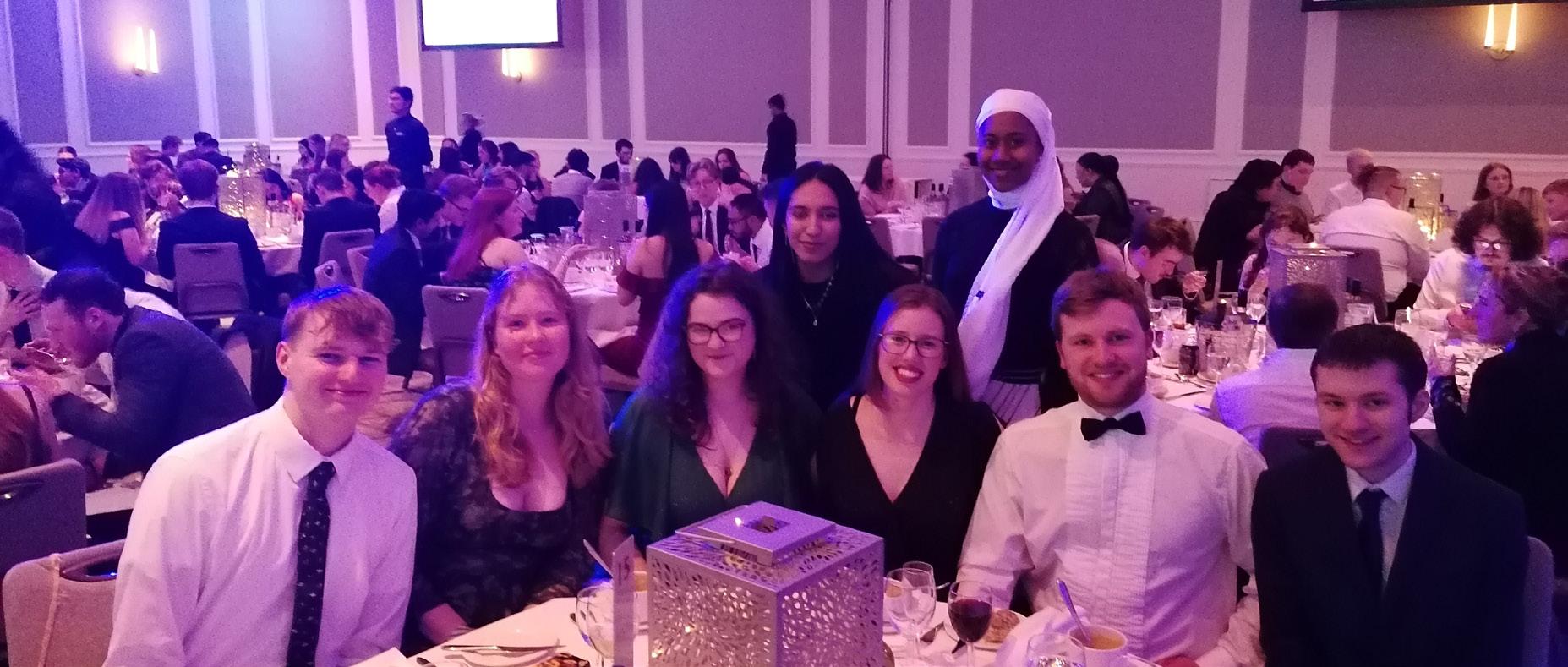
Firstly, Libby, I’m so proud of you! I truly believe you were what Concrete needed this year and I’m so glad you got this chance to show what you could do. (Also, where would my knowledge of Swiftie-lore be without you and
Louise!?) Your warmth and care for everyone you’ve worked with, including me, is so appreciated, and your belief in me means the world. You’re an inspiration, and such fun too! Eve and I have got a lot to live up to!
Equally Louise, you have transformed Venue into a much-needed, all-out celebration of the arts, and the fact other publications in Glasgow picked up on its greatness is to your credit.
I’ve loved doing the radio show with you (and our little chats outside Union House afterwards!) and doing that and our front page have been two of the highlights of my year. You’re so talented, insightful, such a laugh and a joy to have around – you’ll be so missed next year.
Then there’s my wonderful Co-Deputy, Badriya, a ray of sunshine on stressful days! I couldn’t have asked for anyone
kinder or more considerate to share this role with, and if that wasn’t enough, what you don’t know about social media isn’t worth knowing in my mind! I feel so lucky the four of us ended up together x
Of course, there’s also my former CoOnline Editor (or sufferer depending on your views on WordPress!) Ray, and Lily, who I’ve loved having on the team! And to all our editors, the joy and talent you’ve brought into the Media Office this year has been so lovely! Together we’ve made Concrete into something people actively pick up and read, a big challenge in today’s digital world, and for that I’m so proud of you all! Whatever happens next, this year will always be so special to me, and that’s because of you.
Thank you x
Dear Badriya, Concrete will be a brilliant learning experience for you. You’ve taken a leap into the great unknown. Followed something that wasn’t quite your heart, wasn’t quite your head - I guess one can only say that you followed your gut. You told yourself, once upon a first editorial, that “everything you’ve done, are doing, and will do, will become a breadcrumb in your life” and your time as Deputy Editor is no different. It has taken you to places you never thought you’d be, led to steps you never thought of taking and given you learning experiences you may never have had anywhere else. Your brain is going to feel like mush a lot of the time. You’re going to feel out of your depth some of the time. You’ll be writing interviews and articles on topics you never thought you’d write about. Sometimes, your worst fears will happen and in those moments there will be some people who are there to comfort you and there will be some people to give you a kick up the arse. Sometimes it will be a combination of both, but all will come from people you trust and are able to depend on. As much as people will depend on you, you’ll need to remember to depend on those people too. The people with the same hopes, the same fears and the same drive to be a part of something and do it well. You’re going to be ok.
You’ll be proud of the work you’ve done. You’ll slowly learn how to kill the cringe inside you and try new things and encourage people to do the same. You’ll look back on your first bit of work (in this case, your editorial) and smile at how far you’ve come. You’re going to have some amazing memories that will be preserved in print and in your heart. You’re going to reread your first editorial and cry a little. You’re going to wish you had the wisdom you had now when you began your role. You’re going to accept the fact that life simply doesn’t work like that and that you just keep moving with the knowledge you have now. You’ll wish the best to those that follow you, and tell them that no matter what they’re going to be epic at their roles. You’ll wish the madness could continue for a little longer, but know that it’s time for you to see where “it looks cool” will take you next.
For the past, present and future, I wish you all the best, Badriya.
concrete-online.co.uk ConcreteUEA ConcreteUEA
Cut-outs: Chloe Smith, Unsplash, Unsplash
The University of East Anglia’s Official Student Newspaper since 1992
Wednesday 10th May 2023
Issue 394
Union House University of East Anglia Norwich NR4 7TJ 01603 593466 www.concrete-online.co.uk
Editor-in-Chief
Libby Hargreaves concrete.editor@uea.ac.uk
Deputy Editors
Badriya Abdullah & Matthew Stothard
News
Jamie Bryson
Senior Writer: Eleanor Radford
Home of the Wonderful
Ronaldo Martins
Senior Writer: Alexandra Ashby
Global
Emma Darlington
Features
Sienna Norris
Comment
Eve Attwood
Science
George Barsted
Travel & Lifestyle
Finlay Porter
Senior Writer: Emily Goodwin
Sport
Dan Laughlan
Senior Writer: Drew Murphy
Social Media


Jess Blissitt
Charlotte Guillick
Bethan Rush
Online Editors
Ore Adeyoola
Concrete Photographer
Prakrita Rahman
Venue Team
Louise Collins
Lily Boag
Ray Khawaja
Rosie Kyrin-White
Silver Constantinides
Clem Hailes
Tshequa Williams
Tabi Fielding
Jessica Clifford
Tom Porteus
Millie Smith-Clare
Alexandra Ashby
Rory Kettle
Editorial Enquiries, Complaints & Corrections concrete.editor@uea.ac.uk
Content warning: violence and sexual assault.
Concerns around policing standards have once again become a prominent feature in headline news over recent months after Baroness Louise Casey released her damning review into the systemic misconduct of the Metropolitan Police (London) in March.
The Casey review was commissioned after the brutal rape, murder and kidnapping of Sarah Everard in 2021 at the hands of MET police officer Wayne Couzens. The review had 16 recommendations, including “all firearms officers to be revetted” and “greater independent oversight and scrutiny” from the Mayor of London.
Following the review, much questioning has also arisen at more local levelsincluding in Norfolk, which has seen five serving officers sacked for misconduct over the past four years, alongside 580 complaints submitted by the public in 2021/22. Most of these were about the conduct of officers on duty, including alleged corruption, discriminatory behaviour, misuse of police powers, sexual misconduct and disclosure of sensitive information. In December, Norfolk PC Daniel Comfort was fired for being a part of a ‘grossly offensive’ WhatsApp group (which Wayne Couzens had also been a part of) that included mention of “grooming of young foreign girl” and “the tasering of children and animals” according to an IOPC (Independent Office for Police Conduct) spokesperson.
Speaking to BBC Radio Norfolk on April 28th, the Chief Constable of Norfolk Constabulary, Paul Sanford, revealed his force had seen an increase of 50% in misconduct cases against its staff since January. Seventy employees are currently under investigation from a workforce of 3,339. These are cases brought forward by employees and include allegations of domestic incidents, driving offences and sexual misconduct. Sanford said ten of
these personnel have been suspended, adding: "It is inevitable that during this year, I will be dismissing more officers."
Norfolk Police Federation, which represents rank and file officers, has called for complaints procedures to be sped up, saying they can hang over both officers and those making allegations for months.
A Norfolk Constabulary spokeswoman said: “We take any allegations of misconduct very seriously and have robust processes in place to deal with complaints and allegations made against officers and those in police roles. These matters will be thoroughly investigated, and where there is a case to answer, misconduct procedures will take place.”

A survey by Concrete reveals that almost two-thirds of UEA students agree that UK policing is ‘in crisis’. In the anonymous survey (conducted on campus between the 24th and 28th of April), participants also had the opportunity to express their levels of trust in both national and local policing. Of the 102 participants, just 4 said they had ‘complete trust’ in national policing; 21 said they had ‘some trust’, 49 ‘little trust’, 27 had ‘no trust’, and 1 person was ‘unsure’. Regarding local policing, the results were marginally less negative, with 7 participants saying they had ‘complete trust’, 30 ‘some trust’, 34 ‘little trust’, 18 ‘no trust’, and 13 saying they were ‘unsure’.
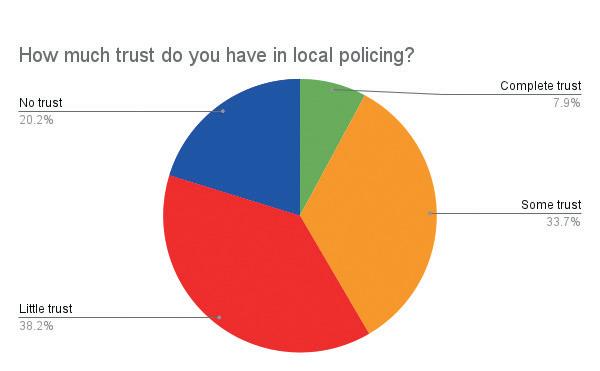
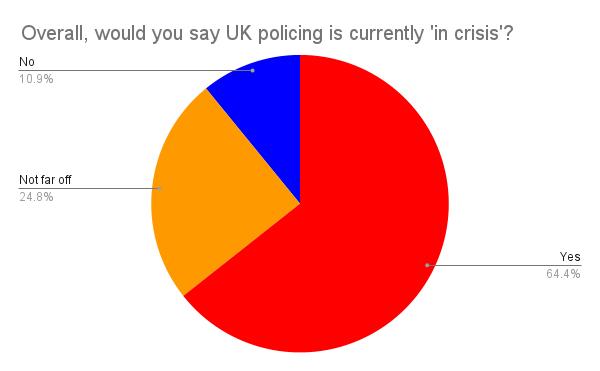
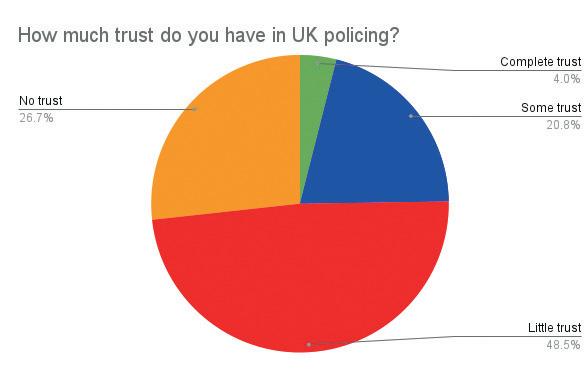
In recent years, several campaign groups, academics and political activists have called for the 'de-funding' of UK police forces. This does not refer to the complete abolition of the service but to a substantial proportion of its central government budget being redirected into local social services and projects (such as youth and community centres for education and sport). Asked to what extent they agreed with this idea, 43 participants ‘completely’ agreed, 40 ‘partially’ agreed, 13 did ‘not agree’, and 6 were ‘not sure’ or submitted another response (‘other’ comment).
Furthermore, following the Casey review into allegations of serious misconduct and cultural issues within the Metropolitan Police, Baroness Louise Casey concluded, "Britain’s largest police force is institutionally racist, misogynist and homophobic". The report also
revealed that at least 548 Met police officers are currently under investigation for claims of domestic abuse, sexual abuse, or a combination of both. Some campaigners, activists, academics and politicians have since called for the Met to be disbanded. Once again, asked to what extent they agreed with this idea, 42 participants ‘completely’ agreed, 38 ‘partially’ agreed, 12 did ‘not agree’, and 10 were ‘not sure’ or submitted another response (‘other’ comment).
Concrete also allowed participants to add anonymous comments about any experience or other views of UK Policing. Here are some:
“I went to a BLM [Black Lives Matter] protest where due to the heavy presence of counter-protesters, I know with certainty had the police not been there to keep the peace, people of colour would have been killed. So I cannot in good conscience say that the police do no good. But currently, the good they do is very much outweighed by the bad”.
“The police can do a wonderful job and normally do. Only the nasty few need to be removed from positions of power. Alas, this is very hard to achieve. There must be enough funding for maintaining law and order, but more funding is needed for pre-policing, such as youth services and reformation programs (for repeat offenders)”.
“People say it's just ‘a few bad apples’but if you've got one corrupt officer and nine who turn a blind eye, you've got ten corrupt officers”.
If you, or anyone else you know, has/is being affected by any of the issues raised in this article (or if you are concerned), please refer to the following contacts: www.reportandsupport.uea.ac.uk (UEA students only)
www.theharbourcentre.co.uk (The Harbour Centre Sexual Assault Referral Centre)
Search ‘UEA Student Services - Wellbeing’ on MyUEA (UEA students only) www.policeconduct.gov.uk/complaintsreviews-and-appeals (The Independent Office for Police Conduct - IOPC)
* 102 UEA students surveyed on campus between 24-28 April 23
The Office of the Independent Adjudicator (OIA) saw a 3% increase in student complaints from 2021 to 2022. The record number of 2,850 complaints led to financial compensation of over £ 1 million.
The OIA deals with student complaints when they have exhausted their own institution’s procedures and are still not happy with the outcome. In the annual report last year, 25% of complaints were either ‘justified’,
‘partly justified’, or ‘worked in favour’ of the student.
A jump has been seen in complaints surrounding academic appeals of assessments and grades, increasing from 29% in 2021 to 38% in 2022. Meanwhile, complaints about teaching, course delivery and supervision fell from 45% to 38%. Furthermore, whilst in 2021, over a third of complaints were surrounding Covid-19, last year, just under a quarter were related to the pandemic.
Some extra pressure has been felt by many universities due to strike action over recent years. Yet, the OIA say
that few complaints related to such action.
Lydia
in 2021, said that most of the teaching was online, so she missed out on time using the facilities. Speaking to the BBC, Lydia explained, "I didn't make a single garment during my first year. I didn't know how to sew or how to use any of the machines in uni," she said.
Speaking to the Guardian, Felicity Mitchell, independent adjudicator at the OIA, said, “We are seeing increasing levels of distress among students who are struggling to cope, and this is a major concern.
At the same time, the pressures on providers make it more difficult for them to support students effectively.”
Students at UEA have also felt the impact of a mixture of online lessons, the pandemic and strike action. Harrison, a first-year undergraduate, said, “It’s impacted my learning this year, and I’ve missed out on a significant number of lessons due to the strikes. Some other online lessons I also feel haven't been as good as they could have been in person.”
You can see details on UEA's official complaint procedure by typing n 'Appeals and Comaplints ' into the MyUEA search tool.
quarter were related to
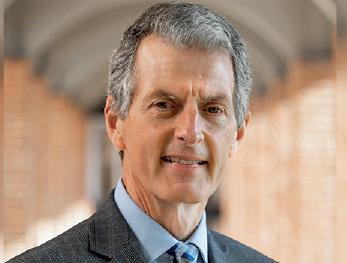
Following the sudden resignation of Professor David Richardson in late February, UEA has appointed Professor David Maguire as the new Vice Chancellor of the University - beginning May 22nd. Until then, the current acting Vice-Chancellor, Prof Christine Bovis-Cnossen, will continue in post.
Accountable to the University Council, Prof Maguire’s role will be to ensure that the Executive Team are delivering on their strategies and vision for the University. The appointment follows a recent announcement made by the University of a £ 30 million deficit this year - rising up to £45m within the next three years. Prof Maguire previously held the position of VC at the University of Greenwich from 2011 to 2019, as well as Interim VC at both the University of Dundee in 2020 and the University of Sussex in 2021. Currently, he is the Interim Principal at the Dyson Institute of Engineering and Technology in Wiltshire.
Speaking exclusively to Concrete, Professor Maguire expressed, “I am very excited about starting, there are really strong foundations at the University and many amazing things happening, but obviously work to do to adapt UEA to the new Higher Education realities we now find ourselves in.” Reflecting on the challenges faced in the job, Professor Maguire continued, “The world of higher education is changing rapidly: the financial realities of years of austerity and marketisation mean that we have to contemplate
carefully what we prioritise and how we do things more efficiently; new technologies such as generative AI are forcing a re-think of what learning actually is and how we assess it; and post-pandemic university communities are determining how to balance work-life priorities, working from home/campus and sustaining good mental health. UEA will, I’m sure, embrace the new and changing environment and adapt accordingly to ensure students get the highest quality education and experience”. Finally, the incoming VC emphasised, “It is a privilege to be the Vice-Chancellor at a university as prestigious as UEA, and I’m looking forward to working with a great team. I hope to be able to bring the whole university together, both to continue the good work of years past and build a better and more prosperous future for the whole community.”
Concrete also spoke to History student Felix Sumner who expressed that he feels “sceptical” about the recent appointment but also explained that it “seems to have been a good choice due to his previous experiences as Vice-Chancellor in Greenwich, Dundee and Sussex. Like many others, I share the view that I hope he is able to somewhat stabilise the financials of the University. Whilst I don’t expect there to be immediate changes to the system, I would expect that in an appropriate amount of time, he gets the job done”.
In a bid to aid students battling addiction (that being alcohol, drug or behaviourrelated), the University of Birmingham has introduced a “recovery flat” – the first of its kind at a UK university. The flat remains in the hub of the university’s student village but champions a policy of no alcohol or drugs, allowing students to remain within the proximity of their peers on campus but simultaneously have a place of retreat. The university plans to introduce a second flat in the next academic year specifically
for female students suffering from addiction. The move is part of a programme called Better Than Well (BTW) launched in 2021 and led by Dr Ed Day, a consultant psychiatrist and the clinical reader in addiction psychiatry at the university. BTW is currently funded by the university and a benefactor, but continued funding has not been confirmed, and discussions are taking place to secure the programme’s future. Better Than Well currently offers around five drop-in sessions a week for students, as well as meditation sessions, monthly sober socials, talks from those who have recovered themselves, and recovery
celebration groups.
British universities currently operate a zero-tolerance policy towards drugs, though this policy is being assessed by a task force. Dr Day claimed that he expected 1,800 students at the University of Birmingham to be tackling some sort of addiction, meaning there are a large proportion of students who require further support and who are at risk of being dismissed due to university policies which have failed to be updated. Though this is the first of its kind to be introduced in the UK, this type of accommodation has been seen repeatedly amongst American colleges. According to the Nova Recovery Center, The
Rutgers Recovery House at Rutgers University in the US was the first sober housing option for college students in the US, opening in 1988. The Recovery House there is entirely anonymous, without signage, in order to protect the privacy of students who live there. Nearly all US colleges offer College Recovery Programmes (CRPs), and 16 listed on the Nova Recovery Center’s website offer “recovery housing” for students.
Currently, UEA offers a low-alcohol or quiet living option when applying for accommodation but does not offer
recovery or sober housing options for students battling addiction. There are also no societies for students looking to achieve sobriety or to find peers who are similarly tackling addiction, though this is not uncommon for UK universities. The University of Birmingham’s BTW team is in the process of supporting other UK universities to set up similar services in the hopes that CRPs will become commonplace amongst higher education institutions.
UEA does, however, have an Addiction Research Group (ARG) led by Professor Caitlin Notley and Professor Felix Naughton. The group produces “research evidence to support people affected by addiction”, with its main research themes being smoking cessation, opiate dependence, alcohol dependence, service evaluation and health needs assessments. UEA’s ARG works with external partners such as Change Grow Live and Smoke-Free Norfolk, as well as other universities conducting research on addiction, such as London South Bank University, UCL, The University of Leicester and Dickinson College. Search ‘UEA Student Services - Wellbeing’ on MyUEA (UEA students only).
One in two women aged between 16 and 34 have experienced harassment, according to the latest Opinions and Lifestyle Survey from the Office of National Statistics (ONS). This includes catcalls, unwanted sexual comments and being followed.
A survey of 100 UEA staff and students has discovered that similar trends exist in Norwich, with 41% of those surveyed having experienced some form of harassment. 88% of those who had experienced harassment identified as female.
UEA students and staff generally feel safer on campus than in the city centre, with 12% of respondents feeling ‘very safe’ on campus, while only 2% felt ‘very safe’ in Norwich city centre. Places that were highlighted as particularly unsafe include areas directly to the north and east of the University, such as West Earlham and Eaton Park, as well as Prince of Wales Road in the city centre. The survey also found that 4 out of 5 UEA students and staff take additional
precautions when travelling home at night. 65% had shared their live location on their way home in the last year, while 66% changed their route home to use better-lit streets. Indeed, much of Norwich uses ‘part night lightning’, a scheme devised by Norfolk County Council to save money and reduce greenhouse gas emissions. This involves switching streetlights off during times which are not considered ‘high-traffic’. 94% of UEA staff and students surveyed said that they would feel safer if streetlights were left on later.
Second-year PPL students
Maanya Shah, Helena Hallas and Gemma Spinks helped organise the survey to understand the depth of this issue and are now campaigning for better-lit streets.
Gemma, an International Relations student, knows all too well the difference streetlighting can make. “I think it’s incredibly important to keep the lights turned on, and I didn’t realise just how much of a difference they made until I was walking home when the lights were turned off.”
Gemma says that some of her
friends have been followed home and approached by strangers at night, which motivated her to do something about it, saying, “It’s wrong that I now plan my life around the streetlights and plan to arrive home before they turn off.
“I shouldn’t have to do this when there’s a simple solution such as keeping them on.” Maanya, who studies International Relations and Politics, believes “this problem persists all over different residential areas of Norwich. I think it’s really wrong that we’ve had to adjust the way we live our lives even though there’s a fix for this issue that could help lots of people feel safer. Hopefully, we can get in touch with the right people and make a difference for ourselves and future UEA students.” Helena, who also studies IR and Politics, hopes that in the future, her friends won’t have to “change their plans because of the streetlights schedule”. Helena, Maanya and Gemma have launched a petition and hope to receive a response from the local council regarding better lighting which you can sign in person in The Hive on Thursday 11th May. You can also submit your support online here: https://chng.it/N5zmqQCx
On the 4th of May, an election for one-third of the city’s councillors took place with Labour remaining in control.
The city council has thirteen wards, with three councillors for each ward, and uses the first past the post (FPTP) voting system.
Councillors help to develop local council policy, lobby other politicians and campaign on local issues on behalf of their constituents. The Labour Party has had control of the council since 2012 and has been led by Labour member Alan Waters, who stood down ahead of the elections after over 30 years as a councillor.
The council, which was established in 1973, represents the lower tier of local government in Norwich and is responsible for issues such as housing, planning, tourism and leisure, with the upper tier being the Norfolk County Council. One major change to the elections, which has caused fierce debate, is the issue of voter identification now being necessary at the polls. Some of the accepted IDs include
PASS cards, Drivers licenses and passports.
The government has argued that it stops vote stealing and is a reasonable approach as we show ID for many different things. It will also bring the rest of the UK in line with NI, where a form of voter identification has been in use since 1985. However, this change has received significant backlash about how this will affect certain groups. For example, it was found in the electoral commission that those from a BAME background were
less likely than white respondents to be aware of ID requirements.
Secondly, research has shown that 3.5 million citizens don’t have access to photo IDs, with the main reasons surrounding time and money. This can be seen with a driver’s license costing between £34-43 and a passport costing £82.50-93.
In the run-up to the elections, Norwich Conservative party incorrectly told voters they wouldn’t need to prove who they were in the local elections. This was done via a leaflet delivered in Labour
strongholds of the city, saying, “You don’t need to take any ID in order to vote, as long as you are registered”. This has led to calls from the Liberal Democrat party for an inquiry into the issue.
For the university ward, 4 candidates stood for election: Beth Jones (Labour Party), Hassan Iqbal (Conservative Party) - a final year medical student at UEA - Sean Gough (Green Party), and James Hawketts (Liberal Democrats) - a second-year politics student at UEA. Jones was elected with 1206 votes, with Hawketts coming second with 512
This follows a trend of Labour control, not only for the ward but for the council overall. The Council remains under Labour control, with 23 out of 39 councillors, although it lost the Wensum and Sewell wards to the Green Party. The Greens and Liberal Democrats make up the rest of the seats, holding 13 and 3 respectively The Conservative party hasn’t held a councillor position since 2011 when they held two seats.
‘While Labour has retained Norwich and made gains nationally, they previously faced backlash over their ‘attack advert’ campaign.
The campaign, with adverts attacking Rishi Sunak over issues relating to the conviction of child abuse, has been criticised by numerous politicians from all major parties as giving in to
the “gutter politics” pioneered during the Brexit referendum campaign.



This has led to a further decline for the party in the national polls, which has been happening since Rishi Sunak entered office back
in October. Despite this decrease, Labour is still ahead in the polls at 43% versus the Conservatives at 29% of the population's voting intention (POLITICO ‘Poll of Polls’, 27th April 2023).
View Norwich City Council 2023 election results here: https://www.norwich.gov.uk/ info/20556/election_2023/3990/ norwich_city_council_election_ results_-_4_may_2023

Soaring food prices, store-imposed product limits and double-digit inflation numbers continue to cause major financial problems for students.
Despite expectations for inflation to fall below 10% from March, this did not materialise - dropping by just 0.3% to 10.1% (Consumer Price Index).
Food production costs peaked in October 2022, and as a result, prices were expected to have dropped by now.
However, with retail sales volumes dropping by almost a whole point, many stores have started to impose limits on the purchase of fresh produce.
Stores have stated the cause of these limits is the UK experiencing the wettest March since 1836, whatever the reason, they have only exacerbated the problems facing the British public.
According to the ONS, the percentage of adults experiencing shortages of essential food items was at 18% in February, but in just one month has made a shocking 8% leap which equates to an extra 5m people.

increased 7% more than food and drinks.
This situation is only made worse by the fact the average weekly salary has
According to the Guardian, student rent averages over £7,300 a year, which is more than the typical maintenance loan and only £2,200 less than the maximum loan of just over £9,500 a year.
A study by Save the Student showed the average monthly student living cost hit an average of £924. This means that even with a maximum loan, for most students, it is impossible to survive without extra monetary support from their parents.
Vice President of the UEA economics society, Wendy Tu, expressed to Concrete that recent inflation “has made it more difficult for students to budget and cover their living expenses, which means more are becoming increasingly reliant on additional financial support”.
Analysts at Capital Economics suggest that the 18-month retail recession may be coming to an end and that warmer weather in April should see sales rebound further.
The Office for National Statistics (ONS) lays much of the blame on the continued rise in food prices, standing at 17.8% more in April than for the same period in 2022 (the highest rate seen in the last 45 years).
This means that by the end of March, more than 17,000,000 British citizens were unable to meet their basic needsrepresenting almost a quarter of the UK’s population.
Housing costs, such as rent and mortgages, and bills have
fallen by 2.4% when taking inflation into account.
These issues are of particular concern to students, with maintenance loans reported to be 7% behind the rate of inflation, according to the Institute for Fiscal Studies (IFS) or £1500 worse over the academic year.
Wendy went on to express concern that “government grants and bursaries may not keep pace with the inflation; hence the increased reliance on student loans will financially burden students with debt for many years after graduation”.
But increased interest rates could put a spanner in the works. Rishi Sunak has vowed to halve inflation by the end of 2023 as part of his government's “five key pledges”, and the ONS seems to feel this is an attainable goal predicting it could fall as low as 2.9% by that time.In the meantime, life will remain difficult for a large chunk of the student population.
Throughout your time at UEA, it may come as no surprise that there are always places to go and things to see in Norfolk that you just haven’t got around to seeing yet. With the summer break fast approaching, there will be an opportunity to venture out of the confines of inner Norwich and see just what sights there are to take in.
As someone who has spent much of his life in Norfolk, there are few things that I haven’t done here at least once already. However, over the spring break, I embarked on a walking trip spanning the entirety of the Norfolk Coast, being met with sights that took me away from the monotony of home that can plague myself or other students that have gotten into a funk at university. Read on and find some ideas whether you’re looking for a day trip out or a budgetfriendly countryside vacation, all no more than a short bus or train ride from Norwich!
Across the county, there are various areas of natural beauty – most notably, the iconic Norfolk Broads National Park.
Spanning the distance between Norwich and Great Yarmouth, the Broads are a labyrinth of man-made rivers and lakes set in the idyllic countryside.
A 15 minute train trip out of Norwich will take you to Wroxham, a town at the heart of the Broads, where you can dine at charming cafés on the riverside and even rent a boat at an approximate rate of £30 per hour, allowing you all the time to cruise around the waterways and moor at any of the parks that run alongside them to enjoy a picnic or the flowing, yet powerful landscape around you.
If you’re ready to venture further afield, the Norfolk Coast AONB is accessible from Norwich, yet provides a landscape that transports one away from the Norfolk that they are familiar with. 45 minutes on


the train to Cromer puts you in the perfect place to explore the coast on the coastal bus services, from the towering cliffs between Weybourne and Sheringham, to the verdant woodlands that enshrine the golden, sandy beaches of Holkham and Wells-next-theSea. There is an abundance of attractions and sightseeing opportunities all around, with many options being free (unless you’re yet to buy a pair of good hiking shoes!). There is a thriving community of holiday homes in the area too, so if you are looking to go on a holiday with friends but don’t want the complicated logistical planning, then look no further, especially with the weather due to warm up and become a lot more pleasant.
In brief, if you want to leave Norwich for some time away, there is no wrong direction you can leave in, for there is something in all corners of our county, no matter your ideal getaway. For more ideas on what to do, from Thetford to Thursford, have a look at Norfolk’s travel page on visitnorfolk.co.uk. Get out there and enjoy your summer!
Although I’ve been in Norwich for almost four years now, I’ve only had one proper summer here. My first summer was totally obliterated by Covid, and my second saw many restrictions remain. Summer 2022 was amazing though. It was the hottest summer I can remember, and although it often felt overwhelming, I still had an amazing time. You might not quite know what to do around here in the summer. You might still be relatively new to Norwich, and have only experienced it in the cold, wet, winter. Or you might have had the same disruptions that I had. But fear not, for Norwich is a breathtaking place, and you don’t need to blow a hole in your wallet to have a good time. So, what can you do?
1. Grab a book, a blanket, and the biggest water bottle you can find, and head on over to the Cathedral grounds. Norwich Cathedral is famous, and when you sit outside, you can really see why. The grassy area just inside the entrance is one of my favourite summer spots to read. You can grab an ice cream or a refreshing drink from the little vans they put up, or you can wander down to the
Tesco on Prince of Wales for some snacks. Either way, you can spend hours there sprawling in the sun.
Yarmouth, you can be there in less than an hour, and you don’t need to break the bank to do so!

2. Picnic in the park. Norwich has some brilliant parks of all sizes, and you’re likely within walking distance of at least one. Whether it’s a big one like Eaton Park, an aesthetic one like Heigham Park, or a teeny one like Chapelfield Gardens, you can find a spot to catch up with your friends and eat some excellent snacks.
3. Take a beach trip. We’re really lucky in Norwich because we’re pretty close to several beaches, many of them just a short, and cheap, train journey away! Whether you want to go to the picturesque Cromer, or the energetic Great
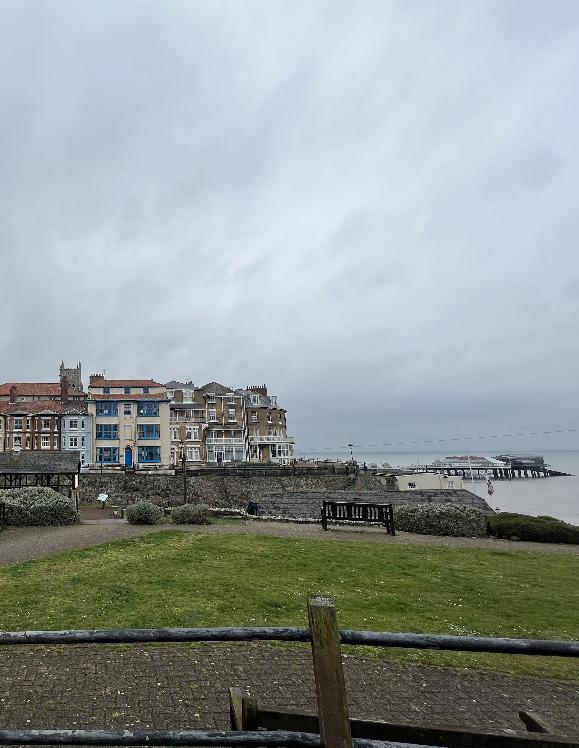
4. Go for a wander. Back when the world was still a little too closed off, one of my go-to warm-weather activities was just walking along the river. I lived in the city centre then, so I’d start along near The Playhouse and find myself at the Train Station. I only needed my phone, headphones and a bottle of water, and I was content. Similarly, there are some beautiful nature sights to wander around, whether it’s the Marston Marshes, or the Yare Valley. Norwich is full of picturesque and peaceful walking routes, so the toughest choice you’ll have is which one to go to!
5. BBQ by the Lake. Make use of UEA grounds and book out one of the handy BBQs by the UEA lake. Watch the sun set and bask in the summer warmth as you grill your burgers and sip from your cans. All you need is BBQ food and you’re set!
“towering cliffs... verdant woodlands... golden sandy beaches”Credit: Ronaldo Martins for Concrete
“Norwich has some brilliant parks of all sizes”Credit: Ronaldo Martins for Concrete
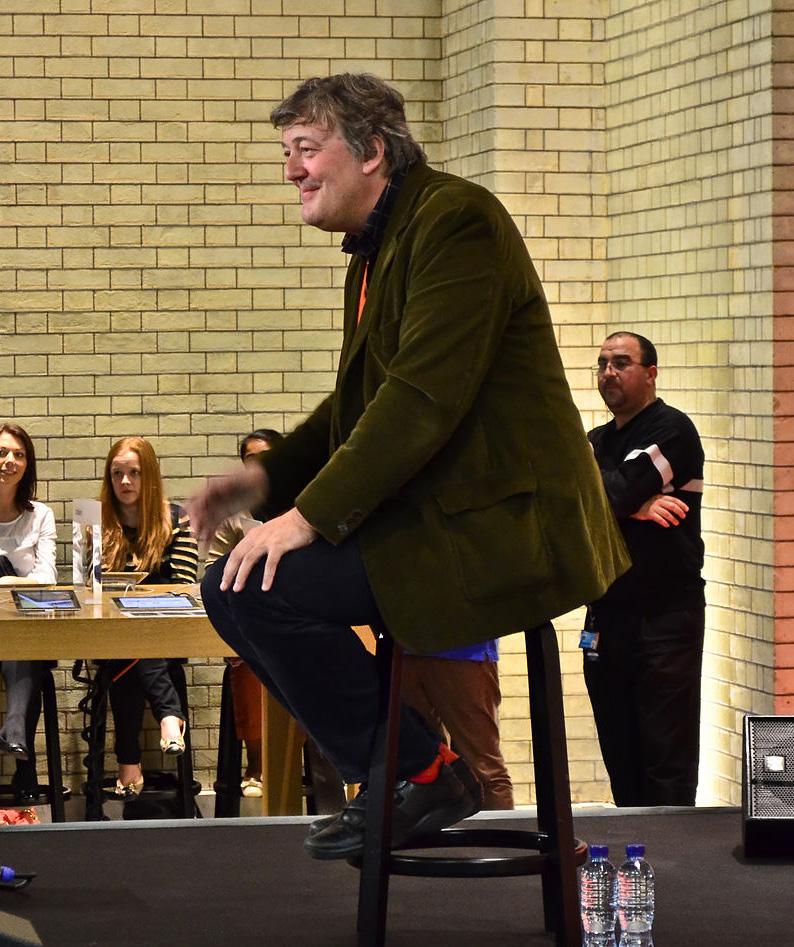 Lily Boag
Home of the Wonderful Writer
Lily Boag
Home of the Wonderful Writer
Acclaimed British actor, comedian, writer, and television personality Stephen Fry is a highly respected and multi-talented figure in the world of entertainment. He is widely regarded as an outspoken advocate for numerous causes including mental health awareness, LGBT rights, and education. Attending the University of Cambridge, where he studied English literature, he later became a household name through his work as the host of popular television quiz show “QI” and starring in the comedydrama series “Blackadder.” An accomplished writer, he’s penned several novels, and to younger generations, he’s best known for his role as the narrator of the “Harry Potter” audiobooks.
Now, launching the Stephen Fry Travel Awards in American Studies with the University of East Anglia, Stephen Fry has chosen to support future applicants to the four-year course with the opportunity to apply for a £2,500 travel award for their year abroad. Designed to help with the costs
of their year abroad in America as part of their studies, Stephen Fry who is originally from Norfolk, has chosen to fund four awards for future undergraduate applicants. This will be available for students on the American Studies course from the next academic year. The aim of the fund is to make study years abroad more accessible to students, specifically to those who would struggle to fund this element of the course.
Ranking as one of the most socially inclusive universities as part of the top 30 in The Times/ Sunday Times Good University Guide 2022 UK rankings, the University of East Anglia has supported over 700 students with donor funded scholarships since 2009. Dr Rachael McLennan, Head of School for Art, Media and American Studies said that this fund will be a life-changing opportunity for students who will receive the travel award, one which is important in a cost of living crisis. UEA American Studies students are encouraged to explore the rich culture and history of the United States and its impact as a global leading nation in their course. The year
abroad option offers students the chance to experience American-life first-hand, and fully immerse themselves within the world of their studies.
Having grown up in Norfolk, Stephen Fry received an honorary doctorate from UEA in 1999. Expressing his love for American culture, as a nation which has such a widespread effect on politics, economics, and the workings of the world, in a six-part BBC television series called ‘Stephen Fry in America’, he travels in a London cab across each of America’s 50 states. The show is considered by many as Stephen Fry’s love letter to America, as the series emphasises the importance of traveling abroad to encourage cultural understanding, value and education.
In a statement to UEA, Stephen Fry said that by partnering with UEA he hopes to encourage more young people to broaden their minds through their travels abroad: “I’m investing in the future of our next generation of thinkers who will go on to achieve great things.”
‘Love Your Leo’ is an annual campaign, run by the University of East Anglia’s Ballet Club, that aims to tackle the stigma surrounding eating disorders and body dysmorphia. By taking photos of themselves in their leotards around campus to spread body positivity, they “promote diversity in a society that says we should all look a certain way.”
With a slogan that states ‘all bodies are ballet bodies’, the campaign raises awareness about eating disorders in sport and was created in 2019 to provide a platform to voice this. In the UK, over one million people experience an eating disorder. This covers almost 2% of the UK population, as reported by Rethink Mental Illness. However, UK Sport research shows that it effects nearly 14% of elite athletes and 1 out of 5 female athletes.
An abbreviation for the form-fitting leotard which is a staple part of ballet sportswear, the ‘Love Your Leo’ campaign supports both its own club members and that of other UEA sports clubs, with the awareness campaign spreading to UEA Surf, Netball and Swimming. Most importantly, the aim of the club is to

make sure everyone feels comfortable and confident participating in sport. Jumping on the band wagon, other universities have chosen to partake in the campaign, sharing pictures to social media to encourage body positivity and challenge stigma.
Raising funds for ‘Eating Matters’, UEA Ballet has donated £700 through the ‘Love Your Leo’campaign to the Norfolk charity which provides young people with eating disorders counseling and support. In The Hive, the central student union hub of UEA’s concrete campus, a body-positivity wall was built to display shared messages of empowerment amongst students.
Taking over the LCR club on campus and their weekly Sports Night, UEA Ballet encouraged all attendees to participate in the campaign by dressing in leotards, unitards and sports kits.
Other initiatives launched by the club include ‘Bring a Buddy to Ballet’ which creates a welcoming and inclusive environment within the club, and raise further funds for ‘Eating Matters’.
In a new recent research report by ‘This Girl Can’, Sport England’s nationwide campaign to get women and girls moving, regardless of shape, size
and ability, ha revealed what they call The Enjoyment Gap between men and women in sports. The report estimated that 5.8 million women in England compared to 8.2 million men regularly enjoy exercise. One of the biggest factors preventing women from engaging in sport included feeling judged by their appearance. Statistics showed that 38% of women felt judged while exercising, 31% have worried about showing their body, and 20% said they were concerned about wearing tight clothing.
Current eating disorder statistics shows that out of the UK population who identified themselves as having an eating disorder, around 25% of those affected are male. With eating disorders most commonly found in individuals between the ages of 16 and 40 years old, most eating disorders develop during adolescence. It’s also been found that among psychiatric disorders, eating disorders have the highest mortality. But the earlier treatment is sought, the higher chance the individual has for recovering.
Affecting all ages and genders, eating disorders and body dysmorphia are classified as mental health issues which can cause severe physical and emotional
damage. UEA Ballet’s ‘Love Your Leo’ campaign offers an opportunity to educate people about body positivity, to reduce the stigma surrounding these conditions and encourage greater awareness and understanding.
 Libby Hargreaves Editor-in-Chief
Libby Hargreaves Editor-in-Chief
You’ve probably found it difficult to find a desk in the library in recent weeks, when people you’ve never even seen in a lecture before suddenly appear to write their dissertationits a sure sign we’re in the midst of summer summative season.
I was curious to know what its like on the other side, to see students frantically search for reference books and watch as they open their third energy drink, so I was delighted to have the pleasure to speak to Leon- a Library shelver who makes assessment period that little bit easier- about what makes the Library and their support so great.
He began the interview explaining his love of books; “First and foremost I’m a bibliophile, before I worked at the Library I ran a unique little bookshop in Norwich and it was great! I’ve always had a large collection of books at home and they ‘re an important part of my life. It was great seeing other people come to the bookshop and watching their collections develop too. “
“I love the UEA Library just as much, but I imagine it’s a little different being staff as opposed to being a student, because I don’t really get to use the study spaces....but from what I can see there’s all types of spaces for different kinds of personalities and different stages of your studies..” He furthered “for example, I recognise you as a Library regular and because you used to sit opposite the helpdesk you kind of looked like you were the boss of the Library, on floor 0 there’s lots of people walking around
and its great for people watching, but you’ve also got the silent reading floors on 2 and 3, which just shows there’s so many places for people to find where they fit in.”
Leon went on to describe some more of his favourite things about the Library, explaining “the view of the Lake on floor 3 is marvellous and really unique, not many universities can say they’ve got that view. When I used to arrive early for work I’d read up there and you’d have the mist rolling off the Lake so I spent more time staring out the window than at my book.
I’ve also done some open days and I always send applicants up there to get the best view of the campus.”
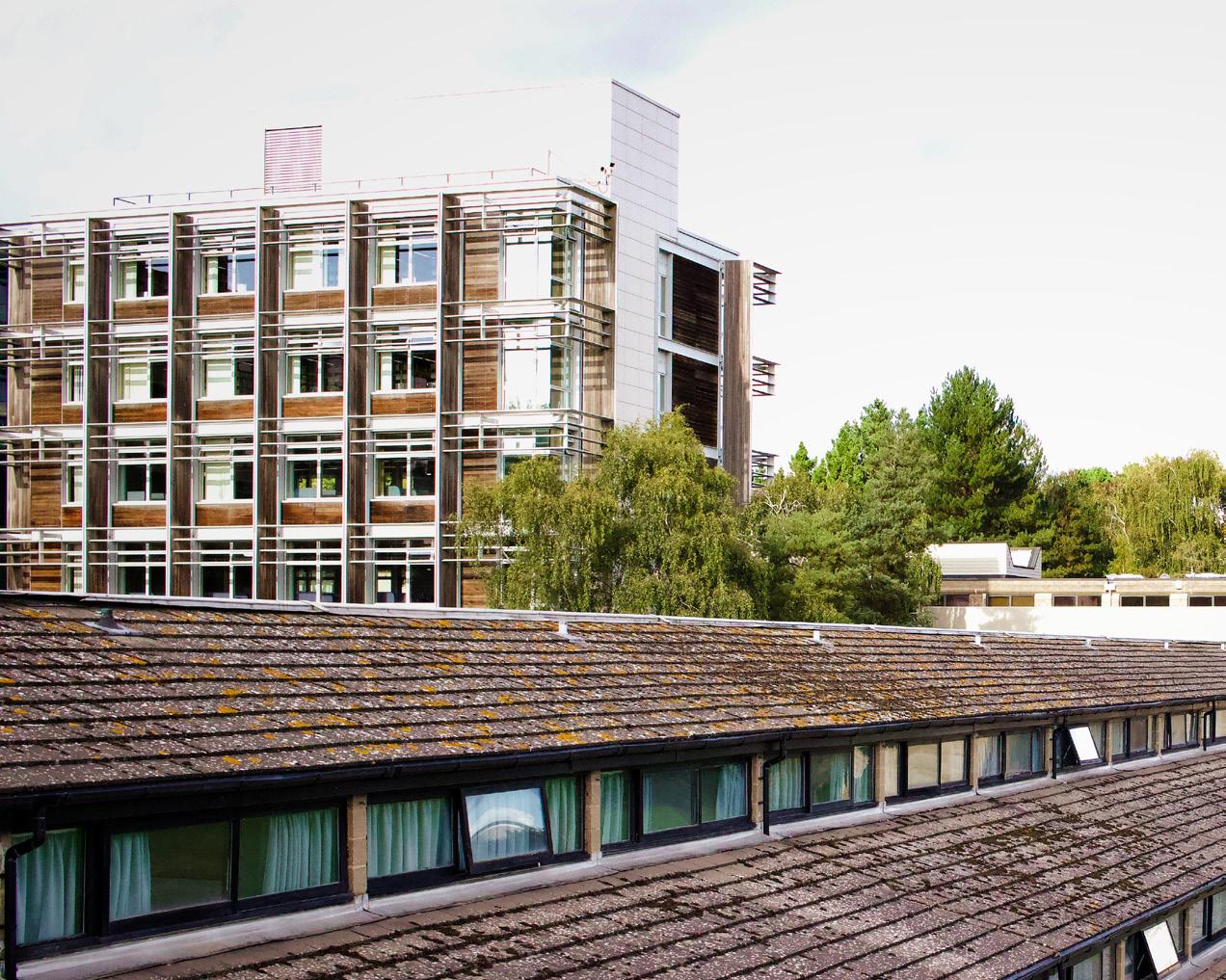
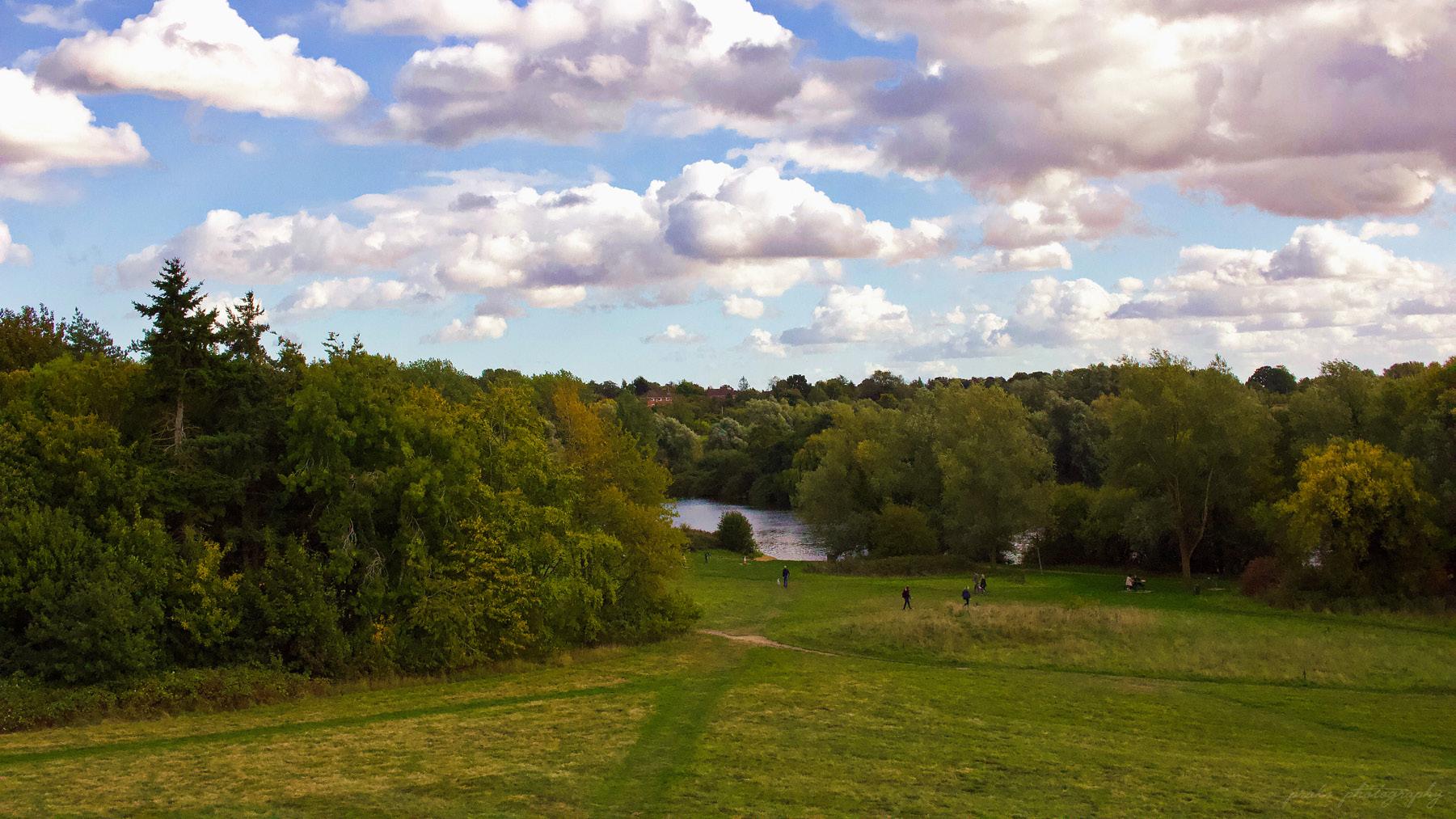
Leon explained more about his role and his interactions with students; “My bread and butter is putting books away and my intention is to know where every single book is in that Library”- this certainly impressed me, I can’t even remember which floor my subject is on! He continued “the best part of the job is when someone comes over and asks you to help find a book, I love going on a book hunt. If ever you need to find a book, do please come speak to us because we love to help with that.” Once the interview had concluded Leon actually expressed an interest in the ‘shelver olympics’, to see who’s fasted to find books, which I think we can all agree needs to be part of the next Derby Day.
I also asked Leon about any unusual books requests he’s experienced in his time working at the Library, to which he excitedly answered “I actually like to think we’ve got it all covered” and explained if there is a more niche book students are
looking for they can always order it in.
As those summative deadlines draw nearer and nearer, I also asked about the variety of support on offer in the Library and he kindly explained “the helpdesk is a really good port of call, the User Experience Team really know their stuff and they do things like Live-chat, the old fashioned phone, emails and any other way you might want to contact them.
We have the Academic Librarians too, and as a Shelver we have different floors that we’re champions of- so I’m champion of floor 01 and I’ve sort of built up this relationship with Matthew, who’s the Academic Librarian for Health Sciences (on that floor) and I’ve managed to be involved in supporting Nurses Day next week , we’ve got a few talked in room 1.06 and I’m helping with displays and things like that.
Of course, the Library is also open 24/7 with the help of security.” Leon asked me what the latest time I’d been in the Library was and I had to admit I’ve pulled a few allnighters in my time at UEA. We got talking about how the darkness makes it a more intimate setting and how the words seem to envelop you when no one else is around.
I asked him how his role varies during these busy assessment periods “Students get quite long breaks in Easter and summer, and we have a reduced crew during those times but my day still gets filled with stacking books, though I have to say its really lovely when you all flood back and it gets really busy again because I get that interaction back . I definitely prefer it when its busy, apart from having to wait
to push my book trolly in the lift. I do try and maximise the library card and work on my individual projects in the quieter periods too, as its such a great resource.”
Finally, I asked Leon about the role of fiction and reading for pleasure in reducing stress levels; “I would definitely recommend reading fiction for that reason. We recently had a display with staff recommendations and it was really nice to walk by and see if anyone had taken my book. That is a really nice touch to encourage students to take a bit of downtime. My pick was J.G.Ballard’s The Drowned World set in the near future where the world is flooded and we’re in the lagoons of London and people are regressing psychologically, there’s
some incredible imagery in there so definitely check it out”.
At the end of our interview, Leon really emphasised his love of the Library and wanted to ensure his passion had come across well- which, of course, it has. So, for his endless enthusiasm and willingness to feature in our final issue of the year, I am very thankful. Make sure to give him a wave the next time you venture through the stacks.
The Beekeeper of Aleppo - 9th May - 13th May - A beautiful play based on the bestselling book. Following a young couple’s escape from war, witness unbearable loss, as well as the beauty of connection. At Norwich Theatre with tickets from £10.
Fashion Disasters at Damn Good - 9th May, 10:30pm - wear your brightest clashing colours, or don your double denim, because this event is for the painfully unfashionable. Head to the LCR, tickets from £3.
Godot is a Woman - 10th May - 11th May - Silent Faces return with their playful and political interrogation of gender and authorial copyright. Playing with Samuel Beckett and Madonna, this play isn’t one to miss. At Norwich Playhouse, with tickets from £10.
Jennifer Saint and Claire North: In Conversation - 11th May, 7pm - Join Jennifer and Claire as they discuss their new feminist Greek Myth retellings. Held at Norwich Waterstones, with tickets from £4.
Eurovision 2023 Song Contest Viewing Party - 13th May, 8pm - Norwich Arts Centre is screening the Eurovision Final live, with drag icons Liv, Dandy and Moth as hosts, with some special guests performing everyone’s favourite anthems. Held at NAC with tickets from £7.50.
Julian of Norwich: mother, mystic, radical - 14th May, 2pm - a conversation between Claire Gilbert and Jeremy Irons about the 14th Century visionary. Claire’s book I, Julian will be available to buy and be signed on the day. At Norwich Cathedral Weston Room, tickets cost £8 plus booking fees.
NHC Resources for the Writer - 16th May, 10:30am - whether you’re a beginner or a published author, a wealth of resources are being offered to you. The event is free at the Millennium Library, but booking is essential via the Norwich heritage site.

Damn Good Musicals - 16th May, 10:30pm - take your spotlight moment, channel your inner Sharpay Evans, and sing your heart out to all the best musical soundtracks. Whether you’re a Glinda, or an Eponine, you’ll have your moment to shine. At the LCR with tickets from £3.

An Evening with Deborah Davis - 18th May, 7pm - Oscar winner Deborah Davis is known for her screenplay of The Favourite and producing Marie Antoinette for the BBC, is coming to campus to mark 30 years of the Scriptwriting MA. Showing clips of her work, and a Q&A it’ll be a must-go event for any script writing enthusiast. Free event in Lecture Theatre 2.
Mind Body Spirit and Crafts Fair - 20th May, 9am - wander the stalls of local readers, healers, spiritualists, and much more. No booking is required and entry is free, at The Forum’s Atrium.


Shewolves - 22nd May, 7:30pm - An empowering play about forging friendships, celebrating weirdness, and about never underestimating teens. At Norwich Playhouse, with tickets from £10.
A Midsummer Night’s Dream - 23rd May, 7:30pm - The HandleBards perform this hilarious production of one of Shakespeare’s most magical plays. When humans and fairies collide in a forest, chaos is sure to happen. At Norwich Playhouse with tickets at £17.
Rep Your Course Damn Good - 23rd May, 10:30pm - we’ve all seen the fashion stereotypes of each course, well now it’s time to embrace it. Wear your sports kit or your nurses scrubs, and rep your course! At the LCR with tickets from £3.
City of Ale Launch Party - 25th May, 5:30pm - a month-long celebration of pubs and brewers, starting with live music, stalls and plenty of activities. Join beer lovers from near and far. At the Waterfront, with advance tickets at £11.
The Norfolk Survivors of the Titanic - 25th May, 10:30am - Join John Balls as he explores some of the issues raised in his book. Why did the ship not survive its voyage? Who were the five Norfolk survivors? Tickets from £2, and the event is held in The Forum’s Auditorium.
Kate Sawyer & Sarah Hardy in Conversation - 25th May, 7pm - Kate Sawyer and historical fiction debut author Sarah Hardy will be discussing their recent novels, reflecting on their depictions of East Anglia, and the journey to practising empathy with those you might not agree with. At Norwich Waterstones, with tickets from £4.
Jane Austen’s Emma - 25th May, 7:30pm - The Pantaloons Theatre Company present this riotous Regency rom-com. The fast-paced show is filled with humour, romance, music and theatrical chaos. At Norwich Playhouse, with tickets at £17.
Hungarian Artisan Street Food - 29th May, 9am-4pm - Wander around outside the Forum to taste some delicious traditional Hungarian food provided by the Sári Shop. No booking required.

Dance Through The Decades - 30th May, 10:30pm - Head to this timeless Damn Good, whether you sport your brightest pair of leg warmers, or bust out your Greaser jacket, you’ll have a great time bopping to some classics. At the LCR, with tickets from £3.
Buffy Revamped - 31st May, 7:30pm - A fast-paced production fresh from Edinburgh Fringe, this show brings you the entire plot of Buffy through the eyes of everyone’s favourite vampire, Spike. It is the perfect parody for any Buffy fan. At Norwich Theatre, with tickets from £10.
True Stories Live - 4th June, 7:30pm - An unpredictable event where people discuss their lives in front of a supportive audience, with a loose theme. Everyone is welcome to join in. At Norwich Arts Centre, on a pay what you can afford basis.
On May 7th, 2017 Emmanuel Macron marched through the gates of the Louvre to the thunderous cheers of thousands of French citizens. This walk marked the culmination of a meteoric rise, the likes of which are rarely seen. However, the true significance of this pageantry wouldn’t have been recognised by many foreign onlookers. Although the grandeur of Versailles came to represent the excess of the French monarchy in later years, the Louvre was the Bourbons’ main residence for over a century, and this fact was not lost on the French public. Macron had presented himself to be a continuation in a bizarre phenomenon in French politics.
Since the 1789 revolution, it seems the French political system has attracted and promoted providential men, in what, political historian, Jean Garrigues refers to as a “nostalgia for the unifying figure of the monarch”.
Although the catalyst for these riots may have been pension reform, the real target of people’s anger is the inherent elitism in the French political system. With Michele Barbero from Foreign Policy magazine stating that, according to the polls, while 66% of voters oppose the pension reforms, 75% object to Macron’s apparent abuse of power.
Speaking on the creation of the Constitution of the Fifth Republic, Delphine Dulong states “De Gaulle wanted a president that was not limited”. As a result, the French President holds powers that are unrivalled in the democratic world. They can dissolve the legislature, appoint the Prime Minister, shape foreign and defence policy and unleash France’s nuclear weapons. However, the power most pertinent to the protests is the ability to force through legislation without the approval of parliament, given to the President by article 49.3 of the constitution. Macron used this to implement these pension reforms without any public support and is paying the price.
As stated by Catherine Field of the NY Times, “France encourages a presidency where monarchical ideas take root like tropical plants in a hot house”, and when it comes to nurturing these ideas Macron may be the greatest florist the French Republic has ever seen. This being exemplified by a statement Macron made to journalist John Lewis-Stempel, “I am never late, because nothing can start without
me”. The list of examples of Macron’s monarchic nature and imperious leadership style is almost unending, whether it be chastising a child for not calling him ‘Sir’, saying a “normal” person could never be the president of France, or his plan to host a banquet for King Charles at Versailles in the midst of the current unrest. Macron is not merely a continuation of this phenomenon, but its zenith.
The protesters’ countless crowned effigies of Macron paint a clear picture that the French people are ready to move on from the Gaullist presidential ideal and that reforms to the constitution need to be made.
Much of the basis for all French law has centred around Rousseau’s social contract, sovereignty lies with the people and always will. Laws are not fixed or finite: they must change and evolve according to the wishes of the people. The Fifth Republic’s powerful presidency was needed in the uncertain postwar nation it was created, but that is no longer the case. Macron has frequently taken advantage of the immense and unequalled power he holds, alongside ruling in an imperious jupertarian style. The consistency and scale of rioting during his time in office clearly represents a desperate desire, and need, to move on from this style of leadership through constitutional reform, with an article in the Observer suggesting a desire to move towards a “Westminsterstyle parliamentary system”.
Macron represents everything De Gaulle wanted in a President, but times change. The people want more than to overturn the pension reforms, they want Macron and the monarchic constitutional ideals he represents gone. Events are transpiring in a very similar manner to 1789 and a multitude of other monumental movements that have come to characterise the outsider perception of French political life since.
Reports of riot police in Paris stepping down and joining the protesters in chanting “Louis XVI, on l’a décapité, Macron, Macron, on peut recommencer” which translates to “Louis XVI, we decapitated you, Macron, Macron, we can start again”, suggest similarly prodigious action is on the horizon.
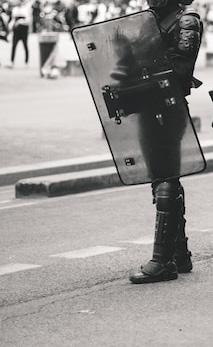

While I do not mean to suggest that Macron will be facing the guillotine, I feel very strongly that with these riots we may be witnessing the end of the Fifth Republic, or at least the Fifth Republic as we know it and as De Gaulle wished it to be. The ideals of “Republican Monarchy” have been losing popularity since

When the supermarkets across the UK were hit by a dearth in tomatoes and other salad items in February this year, there was an outcry that it was causally related to Brexit. This is because the UK has left the single market, making it more cumbersome to trade with other countries.
Yet, perhaps more importantly so, this issue was related to crop failures and shortages caused by irregular weather in countries like Spain and Morocco, where the UK imports 16% and 35% of its tomatoes respectively, as well as uncertainties surrounding energy prices in the Netherlands where the UK imports 34% of its tomatoes. While Brexit may well play its part in curtailing the smooth supply of produce into the UK, we are met with an even greater challenge; that is, the climate crisis, which exposes the tenuousness of the global food system.
Consuming fruit and vegetables that are out of season is a common practice, as we habitually expect supermarkets to supply us with the same foodstuffs all year round. Whilst we might feel the immediate sense of disappointment and frustration that our salad will
lack the seemingly irreplaceable contribution made by the tomato, perhaps this is a small shortcoming to experience in the context of environmental collapse, which predicts more irregular weather and crop failures to come.
While the environmental secretary Thérèse Coffeys’s comment that we should eat more seasonal foods, such as the turnip, may have some recourse, there is a sense that this suggestion falls short on its promise: 1) this country appears to rely overwhelmingly on imports and 2) there is not a sufficient amount of investment in alternative food systems.
A growing movement of fringe farming, however, is offering an insight into how our food systems could become more diverse and seasonal. However, it is pertinent that the government provides funding that will help to inaugurate an upscaling of local food enterprises, which will help to uphold both food and job security.
The current state of the supply chain, however, means that supermarkets are able to monopolise on products such as sliced bread and carrots, leaving farmers with only 1% of the profit on key items such as these. This strains the system even more, in terms of investing in sustainable farming
practices, that may well give rise to biodiversity over monoculture.
Greater investment in renewable energies, however, could potentially facilitate the growing of tomatoes in greenhouses for example, as well as mechanisms that can help capture waste heat that would help power greenhouses.
However, it could also be that food shortages engender more reflection on the implications of our own expectations.
Do we really need tomatoes all year round?
Whilst monetary investment is absolutely requisite, we too as consumers arguably need to invest in the very idea of an alternative food system. In times like these we seem to be given a sign of what is less to come and yet it may well turn out that in this case, less is truly more.
On the 24th of February 2022 Russian troops poured into Ukraine from Russia, Belarus, and Russian-annexed Crimea. The invasion was intended to be swift and decisive, yet more than a year later Kyiv and the Ukrainian people maintain their resilience.
At the heart of the invasion lies Vladimir Putin, a dictator consistently proven to be a warmonger, whose obsession with cementing his legacy ranks above fulfilling the desires of the Russian people.
Ukraine has been one of Putin’s primary targets since coming to power, and in one of his own essays describes Russia and Ukraine as one and the same, believing it to be his duty to ‘unite’ the countries under his regime. But why Ukraine, and what are the global implications of the invasion?
One of the reasons for invading Ukraine is that there are still Ukrainians who sympathise with Moscow despite the atrocities committed by Russian forces. These supporters are a very small minority and have been subjected to a full-scale propaganda war conducted by Putin.
The supporters are mostly ethnic Russians living inside Ukraine and, according to Putin, have been persecuted by the ‘Fascist’ Ukrainian government. This propaganda has helped enable Putin to justify the invasion, describing it as an

operation of denazification. In spite of his efforts to deceive the people of Ukraine, a survey by Lord Ashcroft Polls reveals that over 80% of ethnic
Russians in Kyiv believe that no part of Ukrainian territory belongs to Russia.

Denazification is far from the true reason for Putin’s invasion however, as his main concern stems from the ever-growing ties between Ukraine and the North Atlantic Treaty Organization (NATO). NATO consists of 31 member states and was founded in 1949 with the primary function of securing peace in Europe following World War 2. The main threat to this peace was seen as the Soviet Union, whose relationship with NATO is echoed today by Putin’s Russia. Despite the collapse of the Soviet Union in 1991, Russia continues to see Eastern Europe as its own backyard and has repeatedly pushed back against NATO expansion in the region, mostly through empty threats of escalating conflicts.
NATO performs a balancing act that pushes the limits of what Putin will stand for before he bites back, and the admission of former Soviet states into NATO ranks amongst his strongest agitations. When Ukraine began to seek membership in the early 2000s the member states of NATO were all too aware of the tensions and the potential for all-out war with Russia that admitting Ukraine could bring. The invasion then, can be seen as a Russian counter effort to the ever-expanding alliance of NATO, but has had dire consequences for Putin’s imperialist dreams of expansion in the region. Several countries in Russia’s close proximity have begun to eye up
membership before they suffer the same fate as Ukraine. Finland for example, became the 31st member of NATO on April 4th, doubling the size of the border that Russia shares with the alliance. Sweden is also on its way to joining, but faces opposition from NATO members Turkey and Hungary, who rely heavily on Russian gas imports for their energy.
The invasion has also prompted members of NATO to finally fulfil their agreed targets on military spending. Germany, Europe’s largest economy, had long fallen short of the 2% of Gross Domestic Product they agreed to spend each year on their military, until Russia’s invasion prompted a drastic U-turn in policy including committing €100bn to modernise their military. Upon entering power, Germany’s Chancellor Olaf Schulz focused on domestic modernisation ahead of foreign intervention but stated that “President Putin created a new reality with his invasion of Ukraine. This new reality requires a clear response.”

As I write this article, many see the invasion as a colossal mistake for Putin’s Russia. The conflict has cost the country hundreds of thousands of lives, billions of dollars, and has strengthened the ties between NATO allies. The questions that remain are how and when will it finally end?
When, much to the surprise of most military analysts, Ukraine resisted the initial invasion, their hopes of restoring their territory expanded to include the areas that Russia annexed from Ukraine in 2014.
A poll by the Kyiv International Institute of Sociology found that around 2/3 of Ukrainians want their country to try and retake all
its former territory, including the 2014 territories such as Crimea. Unfortunately for Ukraine, Putin’s obsession with his ‘legacy’ relies heavily on maintaining Crimea as a part of Russia. There are many in Washington who worry an attempt to recapture Crimea would finally push Putin to nuclear war as he would have no ‘achievements’ for the history books.
Zelensky persists that Ukraine will never concede its land to Russia and will continue to fight until all its territory is restored. In contrast to this however, the deputy head of his office, Andrii Sybiha, has suggested that Ukraine will restore its borders to those prior to the 2022 invasion, and then open diplomatic talks on the issue of Crimea. It is also important to remember that Ukraine relies heavily on NATO’s and especially the United States’ funding and military support to fight the Russians, and that the Americans are yet to commit to aiding Ukraine in restoring Crimea to their territory. When and how the conflict will end therefore depends upon whether NATO values appeasing Ukraine enough to provoke Putin, with potentially nuclear consequences.
In the previous issue of Concrete (14/03/23), Norwich South’s Clive Lewis MP (Labour) called for an “official investigation” into the UEA’s current financial crisis and demanded the government “step in and find some support for the UEA”. In addition, the self-defining “socialist” also told us these issues were part of “the continued marketisation of the higher education sector” and blamed 13 years of failed Conservative policy for not tackling “unsustainable funding”.
In a bid to provide balanced insight and debate to readers, News Editor Jamie Bryson and News writer Molly Warner reached out to Conservative MP for Norwich North, Chloe Smith (who has recently returned to government as Secretary of State for Science and Innovation) to discuss her government’s higher education record. Ms Smith has represented Norwich last year that she would not be re-standing for her seat in the next general election
MW: Could you briefly outline what you believe to be the main successes of the Conservative-led higher education policy of the past 13 years and how this has benefited students at UEA?
CS: The really key point is that you see increasing numbers of students from a wide range of backgrounds going into university, and I think that’s true out of the UEA as it is across the country. As a former Minister for Disabled People, for example, I take a particularly close interest in the number of disabled students who are at university. In the last five years, students with a known disability rising from over rising from nearly 311,000 to over 450,000 (I’m using the HSA figures there). That’s really positive and also sits alongside other, more economic points, such as the numbers of students coming from what is called ‘low participation’ neighbourhoods in the so-called ‘polar indicator’.
Now that’s full of jargon, but basically, that means people from, for example, the estates in the north side of the city, such as Mile Cross, which historically had really low numbers of people making that choice to take on higher education.
North since 2009 but announced last year that she would not be re-standing for her seat in the next general election.
JB: In a previous interview with Concrete, Clivew Lewis suggested that UEA’s current financial situation was linked to the broader issue of the ‘marketisation’ of the higher education sector.
Do you agree or disagree with thisstatementandwhy?
CS: I don’t think the reforms to funding are the sole factor in the current situation for the UEA. Very clearly, there are some wider forces at play - including global forces. Inflation is particularly obvious; energy costs have been hitting every type of organisation and clearly every university. However, the university has also noted that it’s had some concerns around reduced student numbers and that that’s impacted its financial position.
Fact check: The number of students from the ‘most disadvantaged’ background (under the ‘POLAR’ measurement) increased by 10% between 2011 and 2021 (ONS).
And you see those numbers going up from 136,000 to 163,000 in the last five years. You also see a really encouraging statistic in terms of students from a background of family that has seen unemployment going up from 5000 to nearly 7000 in the same. [I’m talking about the never worked or unemployed line in the HSA figures].
Stepping back from the statistics, you can also see the record in terms of having been able to make funding more sustainable overall - that has come from the fee structures and, indeed, from the previous decision to remove student number counts and caps. That has helped meet demand from aspirational families, which I think is very important.
You also saw under the Cameron government, the UK-wide Science and research spending was protected from the need to make savings in the public finances before later being increased. Going forward in time, under Theresa
Fact check:
UEA’s energy bills rose by £ 5 million between 2021/22 and 2022/23. Student numbers also fell by 8% between 2021/22 and a further 16% between 2022/23 - in part due to governmentimplemented (A-level) grade inflation in 2020/21, which “left many medium [UEA] to low tariff providers undersubscribed” (Public Audit Committee).
Now these are all issues for the new Vice Chancellor to grapple with, and I wish him well in doing that. My view on the higher education finance reforms is that they have, on the whole, been necessary and sensible. Clive would, of course, take issue with the concept of a market, and that’s why he uses the word marketisation as an insult.
May, you see the regulation of English universities having been reformed, meaning that courses can be defunded if they don’t deliver for their students, which is very much on the side of students. And then, under Boris Johnson, you see a better regime for international students, which in my opinion brings, benefits the university and the cultural mix we enjoy in Norwich and UEA.
For me, these are the strong points of the Conservative’s record since having been in government. I think it is absolutely critical that we continue to think about how there can be ways to encourage people from disadvantaged backgrounds into higher education whilst also making sure that the system is sustainable and fair both to the students and to taxpayers more broadly. And finally, more recently, the ‘lifelong learning entitlement’ [From 2025, the lifelong loan entitlement will provide individuals with a loan entitlement to the equivalent of 4 years of post-18 education to use over their lifetime.] is a major plank of Conservative policy and is something I’m very proud that my party has has has put forward and legislated. I think it will be very significant to constituents who are hugely aspirational and want to be able to find the training that matches their goals.
I would also like to add there
I don’t see it that way. I see it as a route that has, on the whole, encouraged higher education institutions to become more sustainable because they’re able to better reflect the costs of tuition and provision. The reforms have also put more power in the hands of students. For example, with the Office for Students and the other regulatory bodies that are there to help make sure that students get what they deserve and need from the system as well. The really significant point is that those reforms have ensured that more students from disadvantaged backgrounds can go to university - that’s really the bottom line for me. Higher education has to be a gateway to a person’s future.
Fact check:
The headline tuition fee of £9,250, set in 12/13, is now worth £6,585 (22/23) in real terms; losses in teaching and research have increased each year since 2012. The Public Audit Committee reported last summer, “The financial sustainability of the sector has been declining since before the pandemic…the number of providers with an in-year deficit
has been £ 70 million of new funding made available to universities to support students facing financial pressures due to the pandemic, which was really important, of course, because students’ experiences were impacted quite dramatically. It was important, therefore, to protect students’ higher education from being impacted by financial needs as much as possible in the midst of such pressures. to be part of a science competition at UEA with a partner from high school.
So I would like to see the UEA continuing to show how that can be done and blazing that trail so that you could get the gap down and help increasing numbers of state school students get the opportunities that are rightly theirs. It is good that we see the number of state school students participating continuing to rise, but there is clearly work to do to close the gap.
Referring now to the latest ‘widening participation in higher education’ data from GOV.UKone of the facts that stood out to us the most was how “Independent school A-level students were the most likely to progress to high tariff HE by age 19 at 57.3% in 2020/21 compared to 26.0% for state school A level students”
- Why do you think this gap is still so substantial?
CS: This is an example of where they’re clearly is still more work to do. I think a university like the UEA holds the keys to a problem like this actually, because, in my experience as a constituency MP, I’ve seen how the UEA has always taken it to be a main priority to reach out to schools in the area and to encourage local school students to see that they experienced that since I was a school student. I remember when I was, I was at school at Methwold High too could have a future at university and to use their status.
The UEA uses its status as a civic institution as a feature of our city to show people what’s possible. I think that’s been really important and actually, I personally have have experienced that since I was a school student. I remember when I was, I was at school at Methwold High School (now Iceni Academy) in West Norfolk, I came over in the midst of studying science to be part of a science competition at UEA with a partner from high school. So I would like to see the UEA continuing to show how that can be done and blazing that trail so that you could get the gap down and help increasing numbers of state school students get the opportunities that are rightly theirs. It is good that we see the number of state school students participating continuing to rise, but there is clearly work to do two close the gap.
The sector contributed £95 billion to the economy last year and “also supported more than 815,000 jobs across England” - since the pandemic, there’s been a spike in
early retirement rates, and at many universities, a significant rise in unfilled vacancies and the freezing of academic recruitment at UEA. Do you share concerns that future academic recruitment at English universities is under serious threat?
CS: I think that [the economic contribution of the sector] should be a source of inspiration to us when we think about what the university sector is about. It’s also about world-leading research, and it’s about extremely high standards. For example, four of our own institutions are ranked in the global top ten. of vaccination programs during the pandemic. Locally, UEA had a role to play there as well - rapidly converting equipment in the labs to distilleries for hand sanitiser and much more besides that, which made a major contribution to all our lives.
Earlier this year, the Public Accounts Committee said this is “we have serious concerns for the ongoing financial health of the sector”, and the Universities UK comments that “there are only so many efficiencies which can be made beforeneedingtofundamentally rethink our working models”
- Do you agree with these statements,andhowdoyouthink thegovernmentshouldrespond?
CS: Of course, I recognise those facts and, therefore, the concern that gives people. What we need is a system that is fair and sustainable for both students and for taxpayers. By achieving that, models will also be sustainable and effective for institutions. Of course, it’s for universities themselves to consider their own models, and I’m sure that the incoming Vice Chancellor will be thinking very carefully about the innovation that could be brought in at the UEA to make sure that a beloved institution has a flourishing future. I want it to be there in the next decade, the next two decades, the next 5 decades; I want it to be there, serving generations of Norfolk people, as it already has. I think there are important things the government can do as part of this, and I’m glad that the government is delivering on our manifesto
commitment to look at the interest rates on loan repayments, which is a step towards greater reassurance for students in the face of obviously the considerable cost of living pressures and anxiety about their repayments.
Under the current system of interest calculation students were paying up to 12% interest on their loans in the Autumn/Winter term of 2022; this rate dipped slightly in March. In
February, the government announced this rate will be frozen at the RPI rate for students starting their course in September, which is predicted to decrease to around 8% (Institute for Fiscal Studies). Maintenance grants and loans will increase by 2.8% from September.
The government is also looking then at a way to more fairly share the burden of student loans between taxpayers and graduates. This was a major point of principle in the reforms. I’ve been in Parliament since 2009, so I was closely involved in the reforms in the Cameron years following the Blair period. Now, of course, society does [benefit from HE education]; as a society, we want to have as many of our people as possible, well-educated
and flourishing. That takes us back to the point about the economic contribution of higher education and people who’ve been through higher education. That, of course, includes the amount that they will pay into the public purse for public services and by means of earning more highly and paying more tax over their lifetimes. But it’s also the case that students, as individuals, get a great benefit from their time at university. It has always struck me, therefore, as really problematic to say that essentially other people in the society around them who are likely to be earning considerably less - for example, the person who’s cleaning the floors at the University lecture hall - should they pay for students to go through, go through their education? You have to get those really fundamental questions of fairness right.
Fact check: The UK currently has the lowest share of public funding in higher education among the OECD countries - currently standing at 24% compared to the OECD average of 66%. It also has the highest domestic tuition fee rates. (Universities UK). It is estimated the taxpayer currently covers 45% of the cost of tuition, whilst students cover 50% and the remaining 5% by private/semiprivate grants (HEPI)
Going on to the other point about pressures on staff - I recognize those pressures, and in fact, as a constituency MP, obviously, a number of the university staff live in the north side of the city. Most recently, I have heard from some about their concerns regarding the revelations that we’ve seen from the university this spring and naturally, in the role of an MP, I went on to discuss those concerns with the university, and I will continue to do that with the incoming Vice-Chancellor. His challenges will be very large, I think, in terms of stabilising the finances and providing confidence and stability to the staff body. Of course, part of the issue for staff, I think, is similar to what many students will have experienced (and to what essentially everybody else in the economy is experiencing at the moment), which is high rates of inflation and, therefore, the impact on their cost of living. So I’m very sympathetic to that. As
EarlierinApril,theViceChancellor of LSE called for “Political leaders across the spectrum [to] support an independent review with a mandate to address the urgent problemsfacingtertiaryeducation” - would you support this?
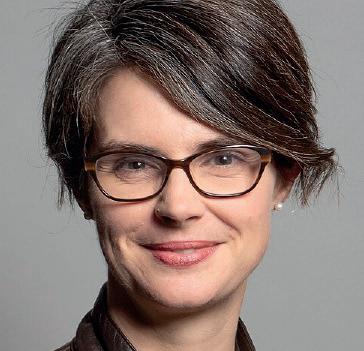
CS: I think that’s an interesting idea. I also see that Universities UK has begun a debate about potential funding models, and I think that’s sensible because the bottom line here is that universities are independent institutions, they are responsible for their own futures, and that means universities have to grapple with those questions. However, of course, there are significant roles that are played by the government, by legislation and by taxpayers, so therefore this is also rightly a matter for political debate. I think being able to achieve that debate on the basis of consensus and as much cross-party agreement as possible would be desirable, of course, because what we’re talking about is a very longterm policy. You’re talking about, for example, loan arrangements that stretch decades ahead.
FInally, would you like to provide a message to our new VC on his priorities over the next 18 months as the institution begins to make substantial changes to its operations?
a general point, I welcome that the government has responded to those pressures across the country as a whole by being able to provide cost-of-living payments and support with energy bills. As the Public Accounts Committee acknowledged in recent research in Parliament, financial pressures can increase the risk of providers failing, closing parts of what
they do, reducing quality or limiting access - and, as they say, all of those things can adversely affect students at a really important time in their lives. You don’t really get those years back as a student, and I really appreciate that. That’s how many students will feel about the preciousness of their time at university. There is a lot riding on the incoming Vice Chancellor being able to set the strategy and be able to bring together and reassure the team of the staff across the university, but also to do that with students in mind.
CS: Well, firstly, a big welcome to Norwich. Our city is a historic, fantastic, flourishing place that has as much in its future as it has in its past. It has a wonderful heritage, and the university is a really central part of that. Every student who comes to Norwich and realises how enjoyable it is to live and study in our city, I’m sure, will join me in welcoming the incoming VC, whose job it will be to continue to lead this very valuable institution into the next decades of its life. But it’s a difficult job. It’s going to be challenging, of course, considering the position that the university has stated that it’s in and considering the many headwinds which go all the way up to major global issues. I really look forward to working with the new VC to do all I can as a local MP to support the university and to support students. Students are one of our most significant assets; we all want to see students enjoying their time at university and then being able to go on to marvellous opportunities that follow. I would also like to encourage the Vice Chancellor to think about the opportunities in the new ‘lifelong learning entitlement’ because, for a university with as much civic pride as the UEA, there is also a further major opportunity here to think about how you can encode continue to encourage people who have an interest in studying throughout their life to do so and to make use of our fantastic city university as they do that.
Goodbye uni. Goodbye adolescence. Goodbye friends. Goodbye Concrete.
In the upcoming weeks I’ll be finishing university after four years. A pandemic and several nervous breakdowns later it’ll all be over. To be honest the only thing I’m really feeling is fear - I have no idea what I’m doing. I started at UEA as an anxious 18-year-old back in 2019, I got to live out my first year up until March when we got sent home for what we thought was a little flu outbreak.
Obviously so much has changed since then, and I think that goes for everyone. A lot of people have asked me if I’m going to miss it here and I tell them the same thing every time, “I’m ready to go,” aka I’m ready to move back in with my parents and not have to worry about writing another essay (hopefully) ever again. But it’s the truth, I did a foundation year hence why I’m graduating after four years instead of three, and although I received that extra year than those who started in 2020, I’m so ready to go.
However, this doesn’t mean that I’m not terrified of what’s to come, at the moment I’m just planning on getting a part-time job until I find a job that feels right for me. At the start of this year, I had it all figured out, I was actually going to stay here in Norwich and get a job, then my very old car decided to die on me after a road trip to Devon, so I had to buy a new one - leaving me very skint. Call it what you wantfate, a coincidence, but not having that option made me realise how much I want to be at home, and every time I go back in the new car I resent, I’m more and more excited to move back home.
Norwich is great, I think it’s the perfect city for me - not too big, not too small, but I don’t have the funds for it, so off home I go, and I know I’m not the only one. The thing that’s perhaps the hardest for me is that I won’t be near my closest friends, and that the only person I’ll be hanging out with will probably be my nan (not that there’s anything wrong with that).
It’s a well-known fact I loathe change and transition so I feel moving home will be the best for me to get through another big milestone in
my life - adulthood. Even though university is meant to prepare you for being in this adult world, it still feels like I’m protected in a little bubble at the moment.
Most of my friends are also leaving this year, so I wanted to ask them and also friends who graduated last year, their thoughts on leaving university and any advice they may have. The first people I turned to were my best friends, we’ve known each other literally since our first class together back in September 2019. Since meeting them I realised you can have multiple best friends who will each accommodate your needs in different ways, I’ve also learned that being the ‘mum’ of the group isn’t so bad. Each time we’ve brought up what we’re doing after university we all say, “shut up let’s not talk about it,” but eventually we did, and I asked them their own feelings about leaving.

Beneath the fear, one of them said, “Despite not having a clue what I’ll be doing within the next year, I can’t wait to see what the unknown brings” and she then proceeded to say the thought of leaving university leaves her feeling the same as Michael Scott in that one episode of The Office: “Okay, it’s happening. Everybody stay calm. Everybody stay calm! STAY F*CKING CALM!” which I’m sure speaks to many people.
My other friend states that there’s so much pressure placed on the next chapter of your life, but “What’s most important is that you take everything day by day and talk to your friends because you are all in the same boat.” We have a joke between the three of us that if one of us isn’t mentally doing that great the other two are, and although it’s hard to go through the anxiety anticipating a new step in your life, I can honestly say that these girls got me through some of my hardest times, even when I’d show up on their doorsteps bawling my eyes out.
Even if you have it all planned out and don’t have any fear clouding your growth, other people are definitely struggling. Scared or not - stick with people who lift you up and return the favour.
Because of my foundation year, some of the friends I’ve made at university graduated last year, and they’ve been a massive help when I’m stressing about what’s to

come, they reminded me that everyone goes at different paces.
The most common advice they had was, “Don’t feel pressured to go straight into a graduate job. It’s okay to take some time, maybe travel and work out what you really want,” oh and of course hangover cures like, “Take two multivitamins with a pint of water before bed after a night out and down a

Berocca when you wake up.” For me, talking to my friends who’ve graduated and realising they have no idea what they’re doing either has helped massively. There’s so much pressure to have it all figured out by the time you graduate, but how in God’s name are we supposed to know who we want to be when we haven’t truly lived in the real world?
Even though I’ve only taken odd jobs throughout uni, ego is such a huge factor that not many people talk about when applying for jobs. You can make your cover letter that’s award worthy but at the end of the day, employers are almost always looking for experience and if you’ve just graduated like millions of other people in the country, you may not stand out to them the way you thought you would - it sounds harsh but it’s true.
The number of times I’ve thought, “I am so perfect for this job” are countless, but I let my ego get the better of me and end up getting rejected. Your friend may have gotten a grad job and a £20,000 salary straight out of uni, but that’s quite rare (especially in the arts) so don’t compare yourself to others, lower your ego and realise you may have to work a part-time job completely unrelated to your degree.
The best lesson you can learn from your friends in the same boat as you is that everybody is different - different abilities, different skills, different mindset - so instead of constantly comparing yourself to others, focus on you and what you want.
This may sound cheesy, but Billy Joel’s song ‘Vienna’ has actually pushed me through this last year, I don’t know what he put in that song to make it hit so hard but, “Slow down, you’re doin’ fine/ You can’t be everything you wanna be before your time” is something I’ve been starting to live by.
after they’ve introduced a potential partner, and they’ve asked the loaded question, “So... what did you think?” Most of the time, you’ll be willing to risk a few red flags because someone’s interested in you, however, here are a few red flags to look out for before diving in.
If they talk about people like Andrew Tate or Kanye West a bit too much - run! Yes, it might just be a case of different interests, but if someone supports a problematic person you should stay alert if it hasn’t already put you off. For example, if they love Peaky Blinders or You, make sure it’s because they enjoy the plotline and not the violence.


If their Instagram feed is filled with influencers in bikinis that all look the same...a conversation might be needed because these obsessions sometimes project their own values or unrealistic expectations of you as the relationship progresses.
When your relationship is incredibly intense from the beginning, sorry to burst your bubble, but it’s probably not your fairytale ending. I’m sure you feel superior to those drab couples who decided to ‘take things slow’ whilst your love skyrocketed, but I wouldn’t mock them just yet. Beware! If a guy claims to love you on the first date, he doesn’t love you! He loves the ‘you’ you’ve given him on the first date, just as you’ve fallen for the fake version, he’s given you. Even worse, this love bombing could be a defense mechanism to keep you trapped. I’m not saying they won’t love you in the future, but
they barely know you! How could they possibly love you so soon?
It might be worth reconsidering a relationship if they don’t respect your boundaries. Often, we all think of boundaries as basic ‘yes/ no’ scenarios, but our boundaries mark out the bottom line that so many of us seem to blur. If someone won’t stop messaging you day and night, even though you’ve told them to stop, or if they claim to be in a relationship with you but won’t accept how you wish to be treated - That’s not romantic! When someone sets out how they want to be treated and it’s not adhered to, alarm bells should be ringing.

Extreme jealousy is the red flag. And no, they’re not just being protective of you, there’s a huge difference. The world of cinema has convinced us true love is found within the bounds of
extreme jealousy, and we should feel lucky to have someone feel such a way about us – but it’s not real life. There’s a distinct difference between jealousy and protectiveness that’s easy to overlook. Jealousy can become manipulative, a projection of their own insecurities that you’re made to feel responsible for. Their jealousy, although it can appear hot and show an intense desire for you, can often become quite obsolete. Often the one thing they are so anxious to ‘protect’ can become the problem, as if you gave them a reason to be jealous in the first place. These red flags are just as applicable to romantic relationships as platonic ones! Red flags are not the be all and end all, because sometimes communicating your concerns will make a change, but it’s when they don’t listen that you need to worry. All we can do is learn and heal through experience.
I was in the gym one morning a few weeks ago, surrounded by other people, many of whom were probably students - running, lifting, and stretching. I became aware of a wonderful feeling in me, a feeling of gratitude, that I get to spend time in the gym and be surrounded by such beautiful energy. People of all shapes, ages, hair colours, skin colours, wearing headphones or earbuds, all taking time to care for their bodies and investing in their future health. I felt lucky to be of witness to this and even though I didn’t know anyone’s name, I felt a curious sense of connection, a sort of intrinsic connection through the wonderful blessing of being alive!

the ugliness that had surrounded me and I took it on as my own. I saw myself as unattractive, fat, someone who did not deserve healthy relationships, and someone who was just not worthy of love and happiness. Beautiful people were a threat, above me, better than me and a constant reminder that I just was not good enough. I was vulnerable, getting involved with people who were abusive, unavailable and who would reinforce my negative self-perception. I tolerated being used, manipulated, groomed because of the way I viewed myself.
Despite this, this is not how I always saw the world. I used to have no confidence in my body, and I was super conscious of my clumsiness. In short, I hated myself. I absorbed
I am writing this as a 46-year-old mature student, reflecting on my growth, I feel a sense of loss, but now I’m also filled with so much consideration for those people in the same shoes I once stood in. I look back on photos of myself and I see myself through different eyes, I don’t see ugly, I see beauty, but it has taken time, therapy and the love of amazing friends in order to get to this point. So why am I writing this? The short answer is because I know that so many people, so many beautiful people see themselves the way I used to see myself and who truly believe they are unworthy of anything but the best. So, I’m writing for those who haven’t learned to love themselves yet, I want to install in you a spark of knowledge, that you are beautiful, and that beauty is not contingent on the way you look. You have a beauty simply because you are alive! I feel so much power holding this knowledge.
I’m 46, a mother to twins and my body is still constantly changing. I don’t see myself the way I used to, I can now connect with the beauty in me and around me and feel so thankful for it! I also know that someone reading this will be thinking, ‘I’m the exception, I am not beautiful.’ I know this because that was my younger self’s mindset. If you are doing this, I will keep praying for the day you get to see yourself through different eyes, because the world does not see yourself the way you do! You are not an exception, just be gentle with yourself, you are enough. It may take some time, but if change was possible for me, I have no doubt you can start that journey too. I wish I had been this empowered years ago, so for that I hope the love and respect I’m wishing you can somehow enter your heart and send you on a path that will lead you to self-love, and a sense of your worthiness so you can allow yourself to enjoy healthy relationships.

“Just be gentle with yourself, you are enough.”Image: Unsplash Image: Unsplash

steady increase in reports of mental illnesses in the population.
It’s been over three years since Concrete launched the “Mental Health Crisis” campaign. It aimed to prevent further student deaths on campus in light of there being three student suicides in 2019. The campaign was supported by local MPs and pressured the then ViceChancellor David Richardson, into committing to making changes. These included increased levels of funding for student services, which provides counselling and other wellbeing activities on campus. Whilst these changes were warmly received at the time, students are still struggling with the support offered, finding the system at times frustrating to use and lacking in support.
One student Concretespoke to stated they felt they had been “hung out to dry” by the student support team. They stated they were struggling with their mental health at UEA and had received a one-off counselling session from the service. During the session, the counsellor the student spoke to emphasised that they’d follow up with the student, but no further communication ever occurred. Other students found they were often directed to workshops and online resources when they felt they really needed longer term counselling sessions. One student said, “I had some counselling and attended a workshop. I think the counselling session itself was okay but I couldn’t book more sessions in advance.” It’s this kind of experience that can be make-or-break for some students. The actual delivery of the sessions are fine, but the system is not working for many students Concrete spoke to.
In the last academic year, 2440 students accessed mental health services at UEA. This figure has been steadily increasing for the past six years in figures obtained by Concrete. This is in line with
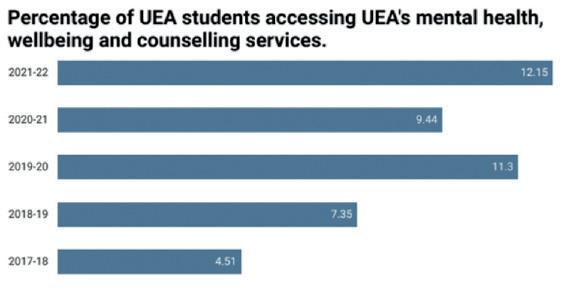
There has been a 38% increase in people being prescribed antidepressants in the UK in the last decade, with a particular increase in those under 25. It’s no secret young people for whatever reason, be it the cost of living crisis or reduction of stigma around mental health, are more likely to report struggling with their mental health.
In light of Concrete’s campaign, the budget for student welfare has also increased. It was over £1.2 million in the last academic year, with £580,000 being spent on 1:1 counselling sessions.
Large parts of the wellbeing support at UEA are often focussed on workshops and activities that many students find lacking in practical help to tackle problems they may face. In the last week, there was the opportunity to pet a hedgehog in the Student Information Zone. This was presented under the guise of wellbeing but really misses the mark when it comes to what students with more serious mental health cases are after.
Very few problems students have with their mental health can be solved by petting animals or engaging in craft workshops.
The last few years have been tough for everyone, but as students have returned to campus in person, it is questionable why counselling sessions are still primarily online?
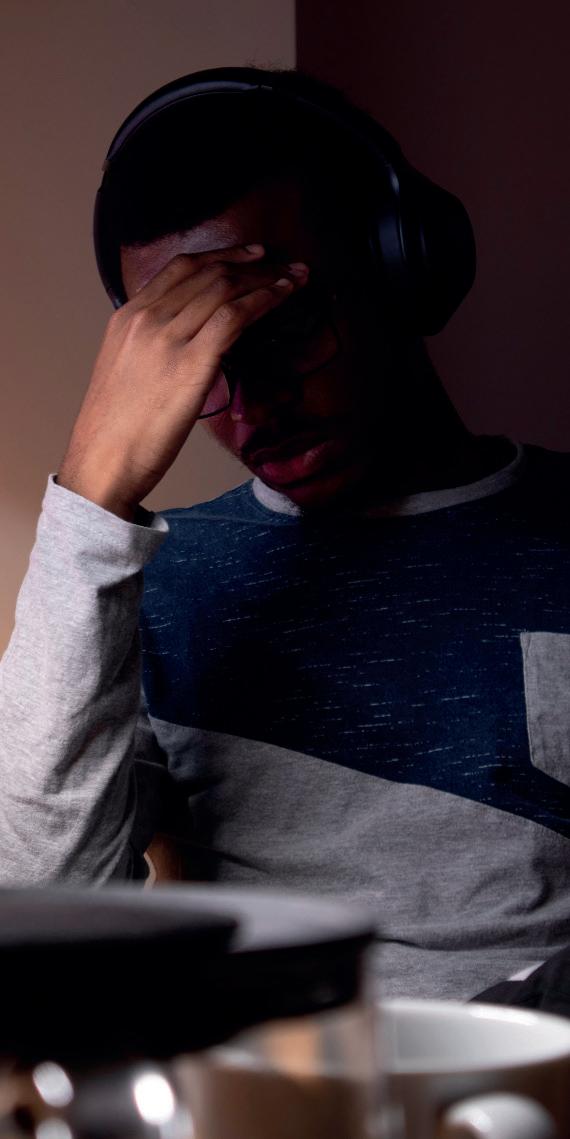
One student Concrete spoke to said they had experienced “moderate to severe depression during the lockdowns due to lack of socialisation” and others spoke of their difficulty “making friends with reduced social skills at UEA”.
Face-to-face sessions aren’t for everyone and it is true that online counselling allows for more flexibility, but surely in-person sessions are still more effective and make it easier to assess whether a
student might be in need of further help. You can glean more from a ten minute face-to-face session about someone rather than an hour-long zoom call on a cramped screen with a dodgy connection.
Concrete spoke to Claire Pratt, the Associate Director of Student Services for Wellbeing. She said the most common complaint students had was that they wanted a longer term plan for one-to-one counselling sessions. The main reason the wellbeing service can’t offer longer-term therapy sessions is because of funding and staffing constraints. There are simply “not enough resources to go around” and some conditions, such as anorexia or bulimia, require complex medical monitoring and so referrals to the NHS have to be made. The team at UEA will refer students to specialist services, but they cannot offer them themselves.
Claire pointed to three major issues which students have been repeatedly coming to the service for in the last academic year. These included anxiety and general low mood, trouble socialising as a result of the pandemic and housing situations, and issues relating to the cost of living crisis. After the impacts of the pandemic, resulting in home-working and school closures, students coming to university have had some of their most formative years disrupted. This is reflected in the increase in students seeking support amongst the UEA campus.
She was also keen to highlight that the service is open to all, emphasising the wellbeing service had recently seen an increase in international students accessing the service, particularly those from Asian backgrounds.
She argued that this might be due to different cultural understandings about mental health, for instance where some countries take mental health issues less seriously, perceiving them as taboo.
These students are more likely to
have higher-risk mental health cases and urgently need to be aware of the support available to them. Claire does point towards workshops as being able to reach those who traditionally wouldn’t know about the support given to them. However, some students struggle with the idea of discussing their problems in environments like this, or would simply prefer to seek face-to-face individual support.
The criticisms Concrete found of UEA’s wellbeing services were nothing to do with the staff delivering the counselling or support. They were largely concerned with the system itself, something the staff admit is down to a lack of resources. One student Concrete spoke to said they found the counsellors to be “caring and quick to respond”. Others said that without the support given they wouldn’t have been able to finish their degree. The work that counsellors do with the tools they’re given is effective, so why are they not granted more resources? The professionals employed by the university in these sectors are often highly-trained, caring, compassionate people who are great at the job they do. They want the best for students, so why are they being hamstrung by the system and forbidden access to further funding? The university currently finds itself in the midst of a financial crisis, so why spend money on vanity projects under the guise of student experience and wellbeing when genuine support and longer-term therapy could be funded?
There are dog walks on campus for the explicit purpose of wellbeing and I don’t doubt people enjoy these. Exercise and fresh air are important for your mental wellbeing – that can’t be disputed. But to put activities like this under the guise of wellbeing, and lumping them in with the same funding as cognitive behavioural therapy, is farcical. Students suffering because they can’t make ends meet are unlikely to be found frolicking around alongside a poodle in Earlham Park as the panacea to their problems.
As the university looks to the future, it would make sense to look at what genuinely matters to its students. Studies show that interventions from the types of therapies offered by the wellbeing service can make a real difference to students’ lives. So why sacrifice funding this in place of what feels like holiday-club-like activities such as petting zoos and pottery-making as substitutes for more meaningful forms of therapy? If stroking a dog for an hour was all it took to cure every student’s mental health problems, we wouldn’t need counselling or antidepressants in the first place.
We are living in a time of crises. I’m writing about much more than a £23 million hole in UEA’s accounts. The climate crisis is rapidly accelerating, biodiversity is declining precipitously, and global inequality is rising. The nature of future societies will be determined by how every company and institution responds to these issues. Radical change is needed to avoid leaving a disastrous legacy. Business as usual would be nothing short of unforgivable negligence.
As an institution with a world-leading reputation in environmental research and education, UEA has a responsibility to exemplify such change; it must continue its pathfinding into the realm of tangible action. While the university has taken some steps towards positive environmental stewardship, there is a mountain yet to climb.
Given the urgency of the above crises, it is imperative that David Richardson’s replacement as Vice Chancellor (Prof. David Maguire) , makes good on the July 2019 declaration by UEA of a Climate and Biodiversity Emergency with a corresponding emergency response.
Let’s look at what tackling these crises and the university’s responsibility to address them could look like. Some (admittedly limited) progress has been made here under the leadership of David Richardson. In addition to the declaration of a biodiversity and climate emergency, the university has targets to achieve net zero emissions by 2045, and an 80% reduction in emissions from 2015 to 2030. They even have a strategy to achieve these goals. UEA’s electricity is certified as renewable, and heating is provided by an efficient (but still gas fuelled) combined heat and power (CHP) plant. These speak to good intentions, but are woefully insufficient. In addition, such targets do not capture impacts arising from the university’s affiliations and their societal influence. The university still banks with Barclays, Europe’s biggest fossil fuel financier. This provides funding and social legitimacy to a bank which continues to award loans to projects that will send us rocketing past 1.5 degrees of warming. Furthermore, CareerCentral still platforms fossil fuel companies, allowing them to use UEA’s reputation for world class environmental research
to greenwash their image. Platforming fossil banks and the UK military sector (responsible for more GHG emissions than 60 nations combined) is disgraceful enough, but permitting the oil giants themselves onto campus is a farcical anachronism. UEA should be a role model for all places of higher education. Its institutional practices and careful selection of affiliations should catalyse positive environmental decisions across the globe. Instead, it is entrenching a catastrophic status quo.
In light of the above, on 7th February, I was one of the members of the UEA Biodiversity and Climate Action Network (BCAN) who presented a set of demands to Prof. Christine Bovis-Cnosson - the acting Vice-Chancellor – and the rest of the Executive Team. We are still waiting for a formal response, but we hope that Prof. Bovis-Cnosson will use her new position to engage with us productively. Our demands include:
(1) Cut all ties with the fossil fuel industry and the banks which fund it
(2) Hire dedicated staff to implement and revise the Net Zero strategy.

(3) Produce a Biodiversity strategy
(4) Rapidly cut emissions from business travel
(5) Roll out plant-based catering across campus
(6) Provide radical climate justice education for all staff and students
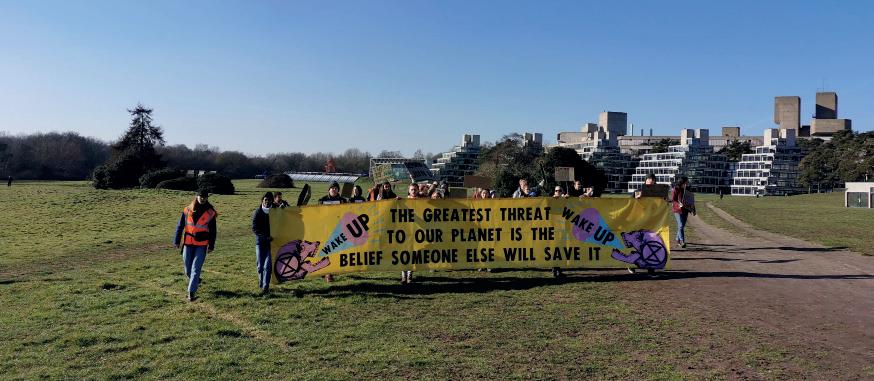
(7) Create climate justice-focused roles
at all levels of UEA governance.
These demands overlap with recommendations from the UEA’s internal Sustainability Board nearly two years ago, yet have not been undertaken. Without pressure from students and staff it seems that these slow crises are all too easily forgotten by management.
Since UEA’s 2019 declaration of a Climate and Biodiversity Emergency, we have seen what an emergency response looks like, with COVID-19 transforming university life in weeks. The climate and biodiversity emergency is clearly not being treated as such. UEA was established with the principle to “Do Different”. It’s time the Executive Team listened to the founders of this institution, and the climate science it has produced, and acted accordingly. As they are not, BCAN will hold them to account through a still-evolving style of community-driven non-violent action.
The upcoming local elections mark the first time in British history where the public will have to produce photo identification to cast their vote. These new government regulations might at first appear to come from a place of common sense, existing as nothing more than an honest attempt to improve the integrity of the democratic process. The reality, however, is far more troubling.
Why is it that the Conservative party, whose entire ideology is (supposedly) grounded in a zest for democracy, lowspending, and libertarian civil values, is suddenly deciding to impose - at great expense to the treasury - such vast
regulations upon something as sacred as the democratic process? Is this not unfamiliar territory for the party known for sending polyester-clad junior ministers onto TalkRadio to froth at the mouth about how ‘big government’ is just a stepping stone to communism?
The devil here is in the details. The photo-ID regulations introduced will primarily affect those from economically marginalised and ethnic minority communities. Or perhaps as it is better put – those who are far more likely to cast their vote in favour of Labour. This decision has nothing to do with the integrity of our democracy, this is about the Conservatives wanting people from Chipping Norton and South Surrey to represent a greater proportion of the voting
population than those relying on food banks in deprived inner-city areas. We should not expect those struggling to put food on the table, or who have never been able to afford a holiday abroad, to pay for expensive forms of government identification simply for the ‘privilege’ of participating in our democracy.

It should also be made clear that we do not, by any stretch of the imagination, have an issue with election integrity in this country. Of the nearly 600 cases of alleged election fraud investigated by the police in 2019, only 4 convictions were made.
It is also important to note that the majority of these investigations
(and convictions) concerned issues such as campaign finance, administration, and candidate nomination, and had nothing to do with fraud related to the actual process of one casting their vote.

The truth is, that the Tories want to have their cake and eat it. They are quite content with wheeling their best and brightest out under the fluorescent lights of a GBNews set to preach gormlessly about ‘cultural Marxism’ or ‘authoritarianism’, yet here we see them introducing legislation set to disenfranchise tens of thousands from the democratic process, all in a desperate attempt to cement their grip on power. I suppose democracy doesn’t seem quite so nice when your safe seat in Surrey is up for grabs.

Sam SladeComments Writer
“UEA has a responsibility to exemplify such change[...]”
“It’s time the Executive Team listened to the founders of this institution, and the climate science it has produced[...]”Photo: ConcreteRonaldo Martins

 Becky Sainty Science Writer
Becky Sainty Science Writer
A recently published study from the UEA is the first to show a link between poor air quality and cognition in babies. 215 infants, aged from 6 to 21 months, were assessed in a rural community in Uttar Pradesh, one of the Indian states most impacted by poor air quality.
The study was conducted by Professor John Spencer from UEA’s School of Psychology, in collaboration with the Community Empowerment Lab in Lucknow (India), Durham University, and Brown University (US). To test their cognition, infants were presented with two displays of blinking coloured squares. One side remained constant, one had a random square changing colour.
Infants lose interest in the consistent display in favour of the variable one, and the rate of this in combination with more squares demonstrates their working memory and visual processing speeds.
Air quality was measured using levels of particulate matter with a diameter of <2.5 μm (PM2.5),
a commonly studied type of pollution. Importantly, air quality was measured indoors, where infants spend most of their time, capturing more relevant variation than previous tests.
Homes that burned solid materials for cooking, like cow dung cake, had poorer air quality. Infants from homes with poorer air quality scored worse on the tests, when controlled for family socioeconomic status.
This study suggests interventions changing cooking materials to ones producing less particulate matter could improve infant health.
These issues with air quality may lead to long term health effects, especially with exposure in critical periods of development. This study builds on previous research linking poor air quality to many effects in childhood, including
neurocognitive health, cognitive functioning, and emotional and behavioural problems.
These studies are vital for understanding the exact effects of air pollution, as well as helping to focus interventions to improve
it is a contributing factor among many. However, 2019 reports estimated 12% of deaths globally were related to air pollution, and in India, where this study was focused it caused 1.67 million deaths.
Although often air pollution is a factor in other disease, 2020 in the UK saw the first case of a coroner ruling air pollution as a cause of death. The case was for a nineyear-old girl, who died in 2013 from severe asthma exacerbated by locally high levels of nitrogen dioxide and PM2.5.
future health.
However, this is also part of a worldwide conversation around air quality. Aspects include PM2.5 measured here, as their small size can allow particulate matter in the air to be inhaled into the lungs before crossing into the bloodstream, then brain.
Other measures include ozone and nitrogen dioxide, which each bring their own health concerns.
The negative effects of air pollution can be difficult to measure directly; most of the time
Outside of the effects of human health effects, all these air pollution components also contribute to broader climate change issues. Changing cooking fuel will make a large difference to communities dealing with pollution in their own homes, but wider measures are needed to tackle the multi-factor problem on a global scale.
TikTok took the world by storm in the months leading up to, and during lockdown, becoming the sixth most used social media in the UK in 2022 (after WhatsApp, Facebook, Instagram, Messenger and Twitter).
Its success has even been replicated by other platforms in the introduction of Instagram Reels and YouTube Shorts; everyone wants a piece of the addictive magic. However, the Information Consumers Office (ICO) has uncovered that it’s not quite the fairytale for consumers and their data. In an investigation published last month, ICO found that there were “more than one million UK children under 13 estimated by the ICO to be on

TikTok in 2020, contrary to its terms of service”.


Readers may be confused, and rightly so, as many of us Gen Z folks remember the agony of waiting for our 13th birthday to create our first- inevitably incredibly embarrassing- Instagram accounts. This is because UK data protection laws outline that companies using personal data when offering information society services (such as social media platforms) to children under 13 must have consent from their parents or carers- which is of course largely impossible for an international platform like TikTok.
ICO also identified that “TikTok failed to carry out adequate checks to identify and remove underage children from its platform”, a concern that was raised “internally” before the
investigation.
As a result of this misuse of children’s data, TikTok has been fined £12.7 million- a historic ruling which critics hope will bring privacy and data safety to the forefront of social media discussions. Certainly, the upcoming UK Online Safety Bill will create more problems for the platform in its requirement for strict age verification processes, which should alarm boss Shou Zi Chew after his run in with Congress over the safety of the platform.
Though, a pessimist may ask if these fines can really make an impact; ByteDance (TikTok’s parent company) made £64 billion in revenue last year, making fines like this from the ICO seem like a drop in the ocean.
Despite the hours many of us spend scrolling, I think many of us can agree that TikTok is ultimately harmful; whether from the point of view of decreasing our attention spans, promoting figures like Andrew Tate or this instance of data misuse, many companies are asking employees to delete the app from their phones, including the BBC.
This leaves many people asking, is time up for TikTok?

“Issues with air quality may lead to long term health effects.”
“TikTok took the world by storm”Image Source: Unsplash Image Source: Unsplash
 Becca
Science Writer
Becca
Science Writer

Who doesn’t love a penguin, especially a wobbly one?
Chaka is a fairy penguin who lives at Sea Life in Weymouth. He is believed to be the first-ever penguin to undergo an MRI Scan at Cave Veterinary Specialists in Somerset. The MRI was done after zookeepers noticed a wobble when he waddled. The MRI investigated this balance issue and the “occasional wobble when waddling”.
Before I worry you any further, Chaka is okay! The MRI scan results came back showing there are no harmful issues or concerns to the little guy’s health.
Chaka’s scan has been described as a significant milestone for veterinary science and medicine.
Pippa Tucker from Cave Veterinary Specialists described the MRI as “something totally new for the team” as they are not used to their patients being penguins! She said, “Unlike the cats and dogs we regularly treat, penguins can hold their breath for a considerable time, so our dedicated team made sure to closely monitor Chaka during the scan.”
The MRI went to plan and was a success as well as Chaka being a comfortable little boy during the scan!
It is hoped that the scan will lead to further advancements in the knowledge of Fairy penguins and penguins in general. Fairy penguins have the smallest population out of 17 species of penguin and Weymouth Sea Life’s Fairy penguins are Europe’s only colony of Fairy penguins. One really cute point to note is that Fairy penguins are also called Little penguins so Chaka really is a little guy!
The scan can now be shared with other vets, sanctuaries and zoos around the world to advance knowledge about Fairy penguins. So, although Chaka is still wobbly, his waddle is making huge strides in veterinary science and he is a pioneer penguin!
A UEA professor in the School of Environmental Sciences has been awarded one million Swiss Francs as one of three International Champions in the Frontiers Planet Prize.
As well as the huge £900,000, Professor Carlos Peres, a professor of Conservation Ecology here at UEA, has been named the UK national champion for his research on communities in protected areas of rural Amazonia.
The prize was presented by the international not-for-profit organisation The Frontiers Research Foundation. The Frontiers Planet Prize was created to accelerate scientific solutions for healthy lives on a healthy planet. Within this, there are nine major problems that

have been identified as a threat to the health of our planet. These include ozone depletion, freshwater consumption, climate change and chemical pollution.
Peres’ article ‘Sustainable-use protected areas catalyse enhanced livelihoods in rural Amazonia’, was chosen by a jury of 100 leading sustainability scientists as a breakthrough with the potential to aid the stabilisation of the planet’s ecosystem.

When we contacted Professor Carlos Peres, he told Concrete: “I’m very happy and this award will further the mission statement of our nonprofit conservation NGO in the Amazon.”
These statements include local food security, gender equity, local community welfare and high-quality applied science.
The nonprofit organisation Peres
speaks of here is Instituto Juruá which he co-founded in Brazil. They aim to continue to implement integrated conservation-development programs across the Juruá and other Amazonian river basins.
So far, Peres’ research has seen the collection of data from 100 rural communities across 2,000km of the major Amazon tributary: the Juruá River. This data has then been used to explore how the livelihoods of residents in sustainable-use protected areas compare with those in unprotected areas. This is a joint initiative which is sponsored by government agencies to expand the protection of the Amazon rainforest.
One of the main discoveries from this research is that communities within the protected areas had better healthcare, basic sanitation and critical infrastructure whereas 67% of those outside of protected areas are
not empowered in the same way.
Congratulations to Professor Carlos Peres and his team for this massive achievement!
“a milestone for veterinary science”
PatchettImage Source: Unsplash
Right2Roam has come into the limelight recently with the court case over land use in Dartmoor National Park. In their own words, right2roam is a group ‘campaigning for the right to roam and free, fair and informed access to nature throughout England’. However, the group has faced critism from journalists such as Magnus Linklater who cited the movement as an ‘excuse to be a vandal’ and has critiqued the attitude of those who ‘see the countryside as their entitlement’.
Concrete sat down with, UEA alumni and Right2Roam Norwich organiser, Meg Watts, to look at what Right2Roam means to them, the issues and what’s happening in Norfolk!
How long have you been interested in land justice? Was there anyone who inspired you to get into it?
“One my inspirations is the zine Weird Walks (Instagram @weird_ walks), based in South-West England. However, I properly got into land justice by looking at the website whoownsnorfolk? This website allows you to see who owns what land in Norfolk and allowed me to see the scale of land ownership.”
YoustudiedCWandEnglishliterature at UEA and have since published an essay. How can we use creative
writing and our words to create positive change for the environment and land justice?
“Some work done in the climate change movement leads a lot of people to terror rather than an understanding for what is actually happening. This can feel paralysing for the average person. Using writing we can communicate science via creative and communicative outlets and create active hope. The more we understand the more we can progress the movement.”


example Extinction Rebellion. The need to have numbers to shock people over understanding that some people will face harder sentences from being arrested is ignorant at best. With Right2Roam, our main form of protest is mass trespassing, a matter of civil law, meaning people can’t be arrested for solely trespassing. This can push for lawful legal change and allows people who feel pushed out from other groups for this reason to join.
One of the issues people may raise with trespassing, especially in mass, is the damage to wildlife and lack of respect for the land. How can we educate people who do trespass to not possibly ruin the land or wildlife
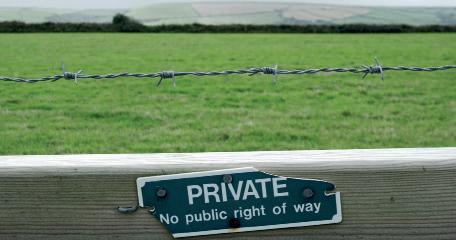
habitat?
“We can educate via workshops about how to forage properly and land conservation. In this area it’s so easy to shut people out rather than educate. It’s also important to show environmental specialists that normal people aren’t a threat to the wildlife, the lack of education is the problem not humans.”
You also run the page @wyrdnorwich, and with Right2Roam Norwich have led Wyrd Trips around the city. How can we use these walks to further land justice in a city setting?
“We can re-explore Norwich through psychogeography, and looking at
what coincidences we see every day. Being more aware of our city allows us to know what we want to see improved and worked on.”
What events have you got coming up as part of Right2Roam Norwich and how can people get involved?
“We are planning to do Wyrd Trips around Norwich once a month, focusing on land justice in a city environment. In terms of outside of Norwich, we have beach trips, wild swimming and camping, online talks and conservation talks. To get more updates you follow us on Instagram @right2roamnorwich, where you can also find links to the WhatsApp group and mailing list.
One of the 3 main goals/points of Right2Roam is that of fair access for all people. We have seen Muslim hiking groups (@muslim.hikers) face online abuse and folklore has been used by white supremacists, in the UK and beyond. How do we tackle the issue of racism that is prevalent in some parts of this movement?
“We can see lots of movements with the climate change movement that don’t seem to see how getting arrested isn’t ‘fair’ for everyone, for
my mam through the underground, whereas in the past I’ve felt too frantic, too much like a fish out of water, to think about taking charge. This time though, my mam didn’t even get a chance.
I never used to think of myself as an anxious person. Aside from a bit of car sickness, I didn’t think I struggled with travelling. It wasn’t until I came to university that I realised how wrong I was.
For almost four years I’ve been making the tedious journey between Newcastle and Norwich, and every time I’m ill until I’m on the train. My energy spikes, I can’t sleep, I can’t eat, and I’m constantly needing the loo (sorry, TMI). There's a pit in my stomach, and I feel inexplicably nauseous but it wasn’t until last summer that I realised, all of this? It's anxiety.
No matter how many times I made the journey, how often I tracked the train’s status, I couldn’t shake the dread. But nevertheless, I persisted. And I think I’m actually, finally, getting better. Is this my beginning as a cool and collected traveller? Probably not, but it’s starting to feel easier.
My Easter began heading to London. For the first time, I navigated me and
The following weekend, I had an eighthour journey to Glasgow. I wasn’t alone, but that’s never stopped the anxiety before. Even when our train was stopped for an hour, and we missed our connection, I didn’t panic. The only moment of frenzy was sprinting across Edinburgh Waverly in four minutes, sitting down as the doors closed.
‘tbc’ sign to change, and trying not to catastrophise. What was the worst that could happen? I’d just alter the route again and pull into Norwich later. And guess what? It was fine. Finally, Easter ended with a trip to Newcastle. I was outside Norwich station, in the rain, and the bus replacement was three times smaller than necessary. I couldn't get on. The panic rose as people around me got angrier. I started texting my mam, trying not to cry. Worst case scenario, I’d go home and travel to Newcastle a day later. But the panic remained. Forty minutes later, I was shuffled into a taxi with three strangers for a two-hour journey to Peterborough, then six minutes to race to my platform. From there, it was plain sailing, (training?). I expected my return journey to be hell. I expected my nausea and anxiety to return, but guess what? I felt okay. I’d even managed to eat some French toast!
Next, Manchester. My original return train was cancelled, and I had to replan the journey. I’d love to say that I kept my cool, but I started to panic in Leeds station. My train was due, I was alone, waiting for that
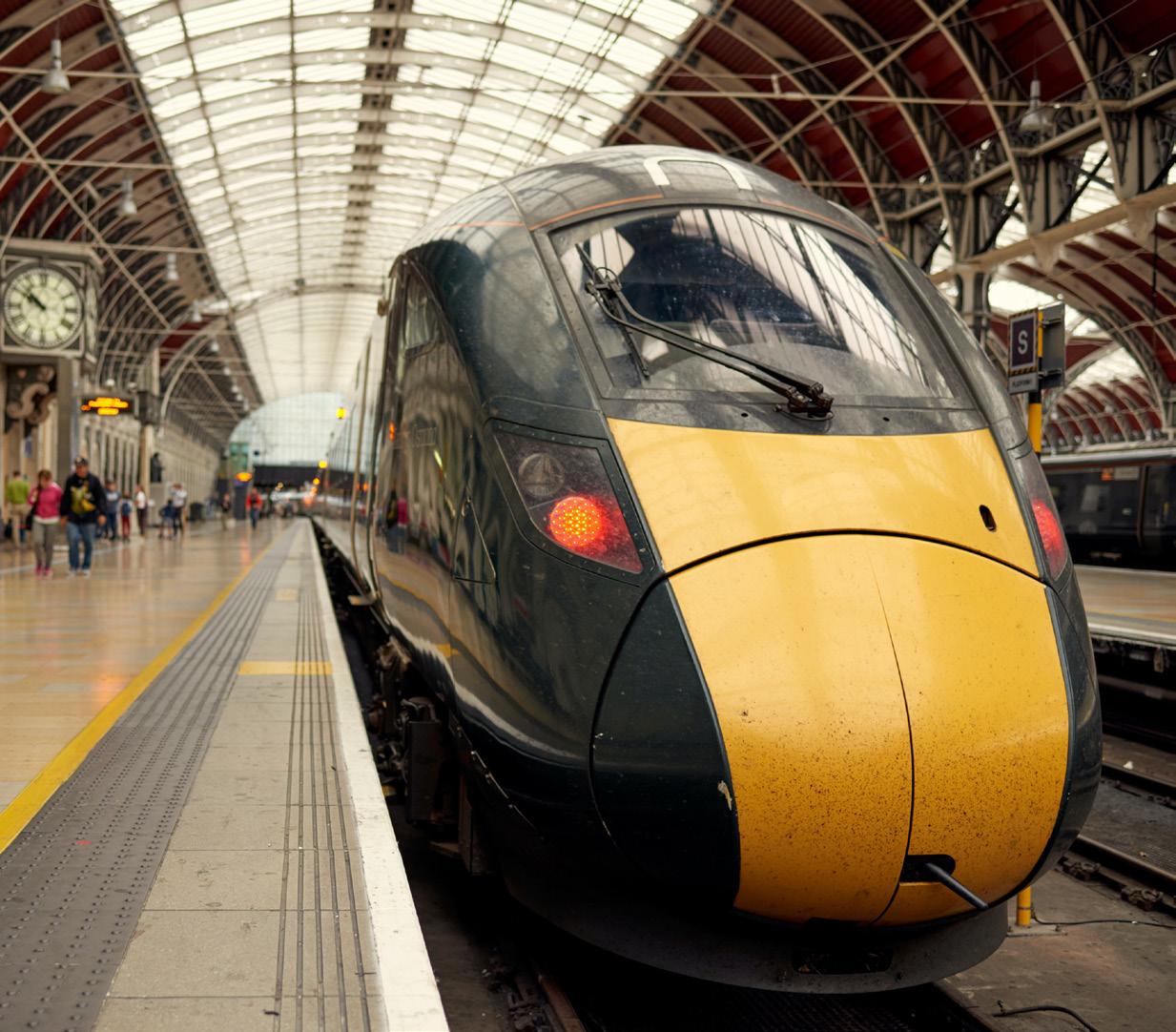
I didn’t do anything to get over this anxiety, but slowly I’ve been managing it. This might not work for everyone, but I always track the train and any connections on the Trainline app, and if there’s delays, I find the next train
and track that, too. I always have a drink with me, and plenty of snacks – especially when I haven’t eaten in the morning. And for my sanity, I keep in touch with my family and friends. My mam will always reassure me, and my friends will distract me with their own brand of chaos.
I don’t know whether I’ve managed to get over my travel anxiety, and who
knows it might come back in a few months, or a few years. But I had to go through some of the most uncomfortable and chaotic journeys I could have imagined to realise that, actually, I’ll be okay. So, next time you’re panicking at the train station, pause. Take a breath. And remember, you'll always find a way back home.
"Our work to deliver aid and vehicles to Ukraine will continue for as long as it takes."
"Take a deep breath. And remember, you'll always find a way back home."
Louise Collins Travel and Lifestyle Writer
CALLING ALL REGGAE, AFROBEATS, AND DANCEHALL LOVERS. If you want to enjoy the best Afro-Carribean music, food, and culture, then the City Splash Festival might be for you. This day festival is full of vibrant live music from the biggest names in the game with the likes of General Levy for the Jung lists, Donae’o for the dancefloor, Chronixx, and many more.
Jacob Simpson Travel and Lifestyle WriterFestival season is fast approaching, and if you’re looking for the perfect all-rounder UK music festival then look no further, Truck Festival has you covered.

Situated on a farm in Oxfordshire, Truck festival has been likened to an indie mecca. They have household names headlining, along with the
The festival consists of multiple tents and stages which leaves you to explore all the sounds booming from the stacked speakers.
Once you have exhausted yourself from having a good boogie, you might want to take a break and locate one of the street food vendors. Food ranges from jerk chicken to vegan ital stew and other tasty treats (and a copious selection of alcoholic beverages for those of you seeking a “liquid lunch”).
best of Britain’s newest rock, punk, hip-hop and pop bands spread across the lineup. I’ve been every year since 2016, when the festival was something of a pilgrimage for local kids to have an idyllic weekend away from the stress of exams and work.
With around 10,000 people attending each year and a strong DIY ethos, Truck Festival feels like a miniature Glastonbury where you don’t need a GPS to get around.
This is the 3rd year of the City Splash Festival and my personal experience of the first one in my hometown was nothing short of perfect. I am not a fan of huge festivals that are overcrowded. City Splash is the perfect balance of good music, good crowds, and good food.
It is only a single-day festival and will be taking place on the Bank Holiday at the end of May (the 29th). If you have time before exams, book a ticket and get a train down to Brockwell Park, South London. You won’t regret it.
Anna Wyeth & Finlay Porter Travel and Lifestyle Writers
Did you spot a big pink bus at any festivals last year? If you went to Reading, Latitude, Boomtown, Wireless or Community, you might have seen our open-top, solar powered Climate Live bus, which provides a venue for talks, workshops and breakthrough music acts.

Climate Live operates in over 40 countries around the world, and is a youth-led charity campaigning for climate justice. The UK branch was founded by UEA student Frances Fox, who has been pushing the environmental movement into the festival scene. Climate Live’s philosophy revolves around the power of music to unite and engage an audience. Gigs, talks and workshops all share this
space to educate and empower the next generation of climate activits. Festivals are a great place to blow off steam, get drunk with your mates and catch your favourite acts live. But they’re also important creative spaces where young people can come together, connect, and learn. Some of my favourite memories from my time at festivals have been in craft workshops, or in the speaker’s corner, because after all the music and dancing of the night before, I feel a wonderful sense of unity with the people around me, and a willingness to engage with causes that I care about.
If you’re not already excited for the 2023 festival season, check out @ climateliveuk on Instagram! Volunteer applications are open this month until the 21st-come and get involved!
In 2019, I saw Foals play a homecoming show at Truck, which was one of the best gigs I have ever been to. This year sees headliners
Two Door Cinema Club, Alt-J and Royal Blood stepping up, and I’m sure they won’t disappoint. I’ve had some of the best weekends ever with my mates at Truck, and I know many others would say the same.
From discovering great new bands to watching established acts on the main stage, Truck Festival really does have it all, and there’s a reason why the people that go seem to return every year. Truck Festival is 20-23rd July and there are still a handful of tickets available for around £130.
Don’t think you can pitch your tent anywhere, because you will get flooded. You have to consider the tempestuous unpredictability of weather. It might say there’ll be nothing but sunny skies for the next two weeks, but that doesn’t mean you should pitch your tent on the bank of a river. If a freak storm hits, you’ll have a rude awakening.
Don’t forget to bring a cooler -Yes, it might be cold outside of the tent, so you might think it’ll be just as cold inside the tent. But, in my experience, it’s always warmer inside a tent-like an oven. So, it’s always good to bring some kind of cooler. Obviously, you can’t haul an actual fridge outside of your tent, but if you’re going to keep your food indoors (where it won’t be eaten by ants) you need to bring something to cool it with, otherwise any perishables will probably perish! You don’t need anything fancy, just see if someone you know either has

a cooler, or a plastic box you can pack with ice. This will be worth it if you plan on eating fruit, bread, or even some meats and poultry. Either way, a sandwich will taste much better when it's not weirdly sticky. You’ll thank me later.
Water is not just for drinking! You may think a few big bottles will be fine for a couple of days, but then you must consider how much each of you will drink, whether you want to wash your hands or brush your teeth and you don’t want to have to walk to the nearest source of running water. When you consider that, especially if you’re in a country that might not have the cleanest water supply or even water you’re used to, it might cause some problems later.
Remember to pick up your rubbish!we go camping to appreciate being so close to nature, so don’t ruin this with littering. Let other people enjoy camping too.
Even if you’re going in the heat of summer, you need to remember that the nights are cold, and you will also be cold. Bring the extra layers, because when we camped last August, I was wearing shorts during the day, and 4 layers at night. Still, my pee was warmer than I was.

Things are going to go wrong. Weather is unpredictable, camping supplies, like anything, are wearable. You never know which airbed will burst, who will accidentally sit in poison ivy. Who will forget to bring enough food. Just be prepared for things to go wrong. My favourite memory camping was when we all huddled in the middle of the
tent, terrified of the storm. So, with a dingy camping light, our dad taught us how to play poker. So, go and have fun!
Concrete Writer
"From discovering great new bands to watching established acts on the main stage, Truck Festival really does have it all"
"My favourite memory camping was when we all huddled in the middle of the tent, terrified of the storm"Photo: Unsplash Photo: Unsplash
UEA made it nine Derby Day wins in a row after demolishing Essex 25-5.5. Every sport was fiercely competed, and it resulted in not just great action but also an incredible atmosphere on campus, from Colney Lane to The Square.
Here is some of the action from the day.
UEA 11-3 Essex (Women’s)
UEA 12-2 Essex (Men’s)
It was the women who got dodgeball underway this year, and what began was a cagey opening with neither side wanting to lose the first set. However, Essex eventually overcame the home side to take it. That was about as good as it got for Essex.
What followed was a dominant display from UEA taking every remaining set to win the game and send the fans watching into a frenzy.
The men followed and a tidy display saw UEA’s Nat Anderson collect the balls and Callum Chow pick off some of the opposition to give UEA a 2-set lead. Essex won set 3 despite a valiant effort from UEA captain, Vish Sathy, as the last man standing for the hosts.
This didn’t disrupt UEA as they went on to win all remaining sets and give dodgeball double delight at derby day.

UEA 67-100 Essex
After a shaky start, UEA Panthers trailed 15-18 at the end of the first quarter. From the beginning, it became clear that Essex would be deadly from the perimeter, and it did not look like they would let up.
In the second quarter, no. 15 for Essex was Red Hot scoring three after three, to see Essex leading 2849 at half time.
Essex’s offence seemed relentless, with impressive perimeter shooting coupled with outstanding offensive rebounding meaning that UEA struggled to get a foothold in the game.
Things weren’t all bleak for UEA as Israel Onibudo put on a show for the crowd gathered in the gallery. He matched Essex with his three-point shooting, working the space inside and scoring around the key.
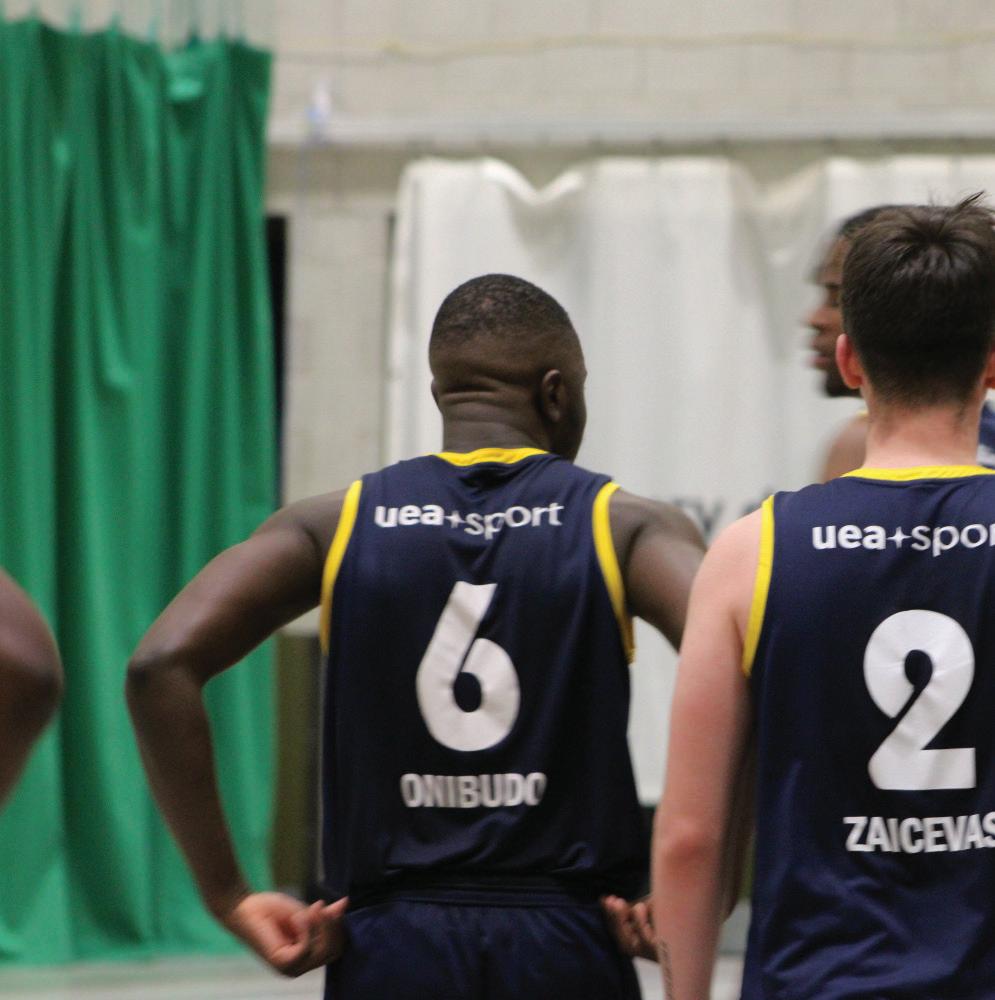
When the 4th quarter began, UEA looked determined to cut the lead and found it through Onibudo when he scored a three to bring the lead within 10. The crowd rallied
behind the Panthers, but it wasn’t to be as some great defence forcing turnovers for Essex allowed them to score easy points and extend their lead.
UEA 8-2 Essex
UEA got off to a great start with a fantastic low-drilled shot from No. 12, which went through the keeper’s legs, foreshadowing an excellent game for the team and not quite the same for Essex. It quickly became 2-0 after No. 9 scored a back post-tap-in after No. 12 found him with a perfectly weighted pass.
UEA then extended their lead with an excellent long-range strike from captain no.8. Essex was awarded a penalty, but was saved, summing up their performance that afternoon.
UEA’s impressive first half was topped with another goal from No. 9, who bundled it in after
some great work to force the goal. Half time, 4-0.
The second half began in the same fashion as the first, with No. 12 scoring, and was quickly followed up by another goal from UEA very soon after. Essex found themselves 6-0 down.
UEA’s No. 5 scored their seventh shortly before Essex scored their first goal of the game. It came from a long-range free kick, which hit the post, hit the goalkeeper, and dribbled into the net.
Essex then doubled their tally with
another goal to show UEA that they were still fighting, but with less than two minutes remaining, it was a little too late. To top off a fantastic afternoon for UEA, No. 11 scored their eighth to finish the game 8-2.
MEN’S VOLLEYBALL
UEA 0-3 Essex
In the first set, UEA took an early lead of 11-6, with some impressive serving which had Essex scratching their heads and looking puzzled about how to deal with it.
But Essex soon pulled their act
together and levelled the scoring at 14-14. From then on, the game was neck and neck, with little separating the two sides. However, Essex began to pull away and won the first set 20-25.
The second set began, and UEA again took an early lead, with 10-4. Essex took a time out to regroup, and it worked. Amazingly, they came back and levelled the scoring at 14-14 again.
Despite the tremendous support for UEA from the side-lines and the gallery, Essex again pulled away and won the second set 18-25 to go 2-0 up.
The third set was a make or break for UEA, but Essex was high on confidence and took the third set 13-25, winning 3-0.
Although they lost 3-0, UEA put on an enjoyable performance, and the atmosphere they created inside Hall
4 was immense. As a final-year
student, it makes me feel a bit jealous that I will not be able to watch them play again.
UEA 6-6 Essex (Essex win on penalties)
Essex took the lead, but UEA responded with an equaliser, 1-1. Essex again took the lead, with some good build-up play and a neat finish from their No.2. But again, UEA did not back down; they equalised through No.17, who was picked out by a perfect pass and scored a welltimed finish.
UEA then led for the first time after No.8 used terrific footwork to fool the keeper with a dummy and slot the ball home into an empty net. However, Essex replied straight back, making it 3-3.
It wasn’t to be for UEA on penalties, but you couldn’t deny the effort the team showed throughout the whole of the game. Both sides treated the fans watching on to a thrilling game.
MEN’S LACROSSE
UEA 4-3 Essex (after overtime)
The game began as back-andforth contest, but it was UEA who had the majority of the chances in the opening exchanges. Despite this, it was Essex who took the lead, but it wasn’t long before UEA answered back through Joe Eagles.
It was a physical battle which saw players take hits, but UEA fought through the blows as well as Essex’s keeper, who had a terrific first-half, to take the lead just before half-time.
As the second-half got underway, it was the turn of UEA goalkeeper, Teddy Minto, to show how good of a player he is making multiple brilliant saves to keep the Us ahead. UEA continued to play some great lacrosse which eventually led to Henry King adding to the host’s lead. However, Essex weren’t finished and managed to pull two goals back before the end of the game, and we went to overtime.
With both sides giving their all, the ball fell to Joe Eagles once more. Already on two goals, the forward fired home his third and gave UEA a dramatic victory.
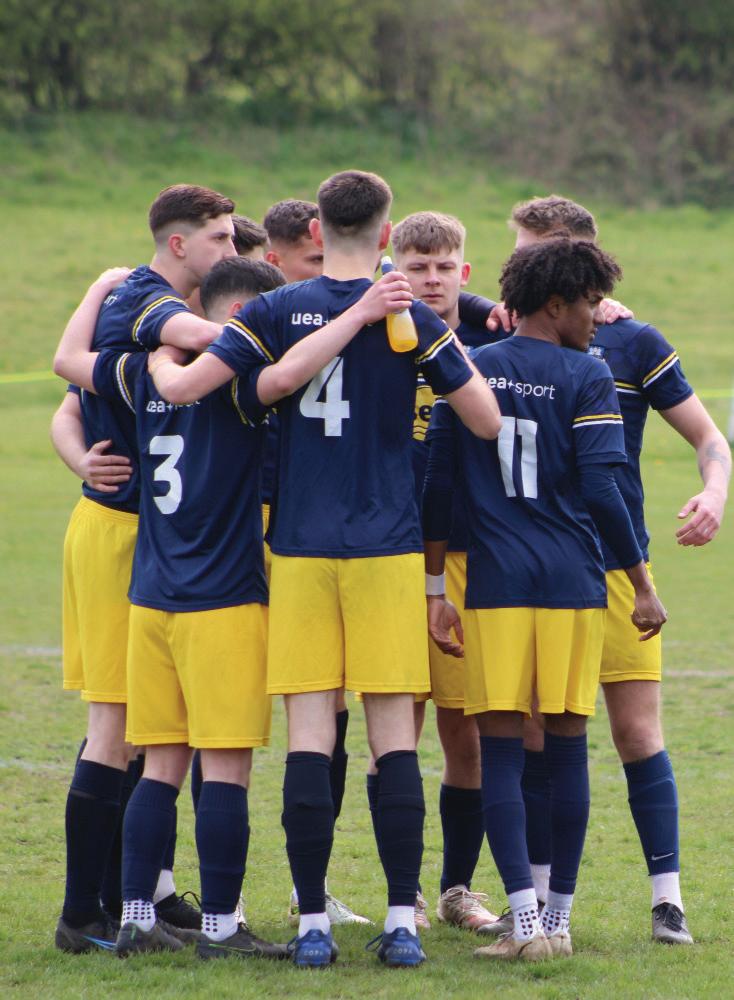
We spoke to match winner, Joe Eagles afterwards on how the moment felt, he said: “It felt like everybody’s hard work across the season had finally paid off. I was just lucky enough to be the one to score the winner.”
There was also a comfortable win for the women as they beat Essex 12-2, congratulations to both teams.
This report comes from UEA team captain, Ollie De Ferrars Green. For Archery this was a head-tohead battle consisting of teams of 8, shooting 60 arrows per person. With few people having the chance to train over the Easter Break, UEA was off to a rocky start with their first few 3 arrow rounds.
However, this did not last and before long the home archers pulled ahead with a consistent lead. By the end of the 60 arrows, UEA was dominant with an 800-point advantage over Essex. This was the first victory of the day and helped pave the way for UEA’s Derby Day win. Both the teams were excellent competitors, securing a friendly atmosphere within the Hall during and after the match. UEA Archery looks forward to next year as another test of skill.
UEA then found themselves in a purple patch, going 4-3 up, after No.12 scored a fantastic freekick that found a gap through Essex’s wall.
They then doubled their lead through No. 10’s goal, scoring through the keeper’s legs. UEA’s No.3 then scored to send them 6-3 ahead. With two minutes to go, they looked in a comfortable position to make it two out of two for UEA futsal.
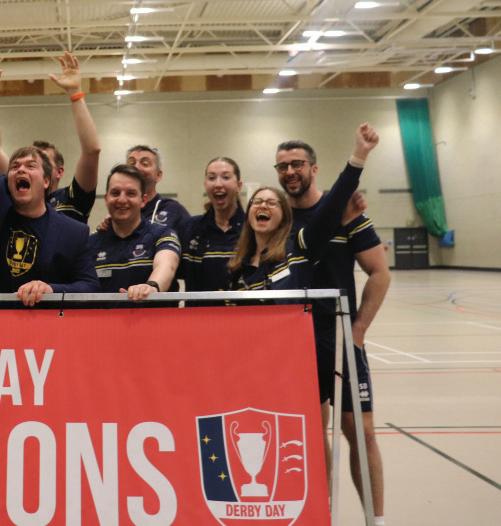
However, Essex grabbed a goal back to make it 6-4. Seconds later, they brought the lead down to just one after another goal. Then the unthinkable, they scored another to level the scoring, 6-6 in the dying moments of the game, sending it to a penalty shootout. Heartbreakingly for UEA, they lost the penalty shootout to Essex.
UEA 2-2 Essex
(Essex win 4-2 on penalties)
In a contest that so often goes the way of Essex, UEA made a strong and dominant start to the game. Archie and Cameron Smith controlling the midfield along with a commanding defence allowed UEA to be on the front foot and their good start paid off after Jack Bowring fired UEA ahead as his effort clipped the underside of the bar before going in.
UEA managed to see out the half convincingly and held Essex’s attack to precious little. Things got better in the second half as early on UEA doubled their lead. However, after being awarded a penalty, Essex were soon back in the game and late on Essex found an equaliser from a set piece sending the game to penalties to determine a winner.
Elsewhere, there were UEA wins in Fencing, Golf, Men’s and Women’s Rugby, Cricket, American Football, Table Tennis, Pool and a clean sweep in Cheerleading. Also taking home the gold for UEA were Men’s and Women’s Badminton, Water polo, E-sports, Baseball, Dance, Judo, Squash and Netball.
A huge thank you to everyone who organised, took part and cheered on the teams at Derby Day in order to make it a wonderful day for all.
After its involuntary COVID-related sabbatical, Derby Day finally returned to Norwich on Wednesday the 26th of April. Packed with snakebite-inspired reverie and its usual spectator-friendly structure, the whole day was an overdue exhibition of student togetherness on home-turf.
UEA Athletics Club, like the overwhelming majority of our sports teams, successfully defended their hometurf. The travelling ‘Essex Blades AC’, stood no match for our men’s and women’s athletes, performing more akin to floppy balloon swords, rather than the sea-axes from which their club takes its name. Ultimately, UEA AC stormed to an overall victory of 151 points to Essex’ 128.
The two teams congregated at the track at around midday. Initial scenes were like something out of an awkward, ‘tweenage’ birthday party. Essex and UEA sat in their respective camps, side by side, not interacting, safe for the occasional wary glance fired across the bow. Hopefully, this tense atmosphere did not suggest to Essex that they would have a fighting chance.
Either way, they were soon to find out
that they did not. Events started at 12:30 and the noise beside the track only grew as the day wore on. Given the numerous other sports on offer to spectators, the volume of crowds at every venue on campus was a true credit to the pride and supportiveness of our student body. From Colney, to the Sportspark and even the square, the East Anglian army was immense and generous in support, everywhere.
Highlights from UEA AC’s battle on the track included the Women’s 4x400m, in which our squad almost lapped Essex’s third runner, thanks to a storming opening leg from Isabelle Nero. Tom Palmer put on a racing clinic to win the Men’s 1500m, whilst former President Alfie Long leant his weary legs to not one, not two, but three races on the day.
The brave fourth-year opened proceedings in the 800m, before coming back for the 3000m and an extra dose of punishment in the 4x400m relay. Like many on the day, Alfie committed himself consummately and without complaint to the blue and gold cause. In the sprints, Serena Grace looked as impressive as she always does, winning both the 100m and 200m for our ladies. At the same time, our inexperienced throwers Toby Asplin and Tomas McLaren Porter vastly outperformed expectations in their javelin and shot-put
campaigns. Sofia Mela and Ellie Taylor also fared well in the jumps, further contributing to UEA’s ultimate victory.
After all the excitement and success of the 26th, good-natured jealousy must surely be directed to our first-year athletes, who stand to experience as many Derby Days as years they can stomach being a student for. A privilege I am sure is mutually envied by most second, third and fourth year’s whose experience has been affected by Covid.
Needless to say, given the performances posted by our young recruits this year, the future of performance at UEA AC looks to be in safe hands. Next year promises further Derby Day success, this time on the cold fields of Colchester. Until then, let’s all bask in the glory of such a massive and overdue win over our sworn, though friendly enemies.
This report comes from UEA captain, Ben Pearson.
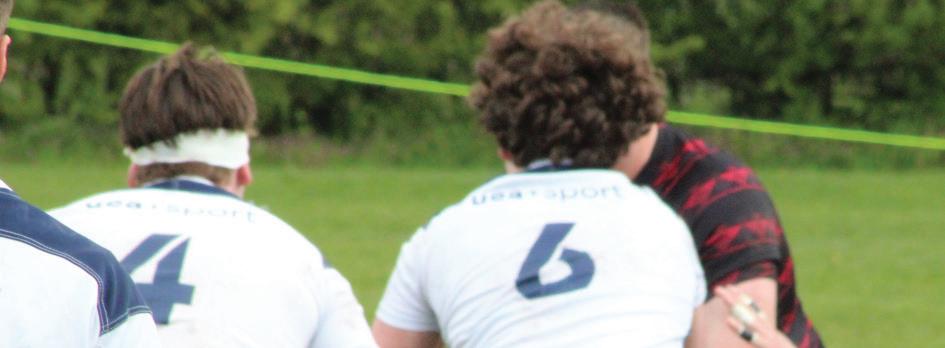
After an amazing season gaining promotion in both our local league to East Premiership and BUCS to Tier 2, we wanted the triple by sealing the deal against Essex. The boys have been training hard all
season and we wanted this to show in our performance on Derby Day.
We drew in a big crowd and expectations were high for our performance, the boys started well and within a matter of minutes we were a goal up with Essex barely getting anywhere near the ball. Goals were flying in from Will Jones and our relentless attitude carried us through to the half time whistle sealing a 6-0 showcase with a well drilled penalty corner routine being scored.
Some fantastic saves came courtesy of Alex Martin and some solid defending from the back line like all season, kept a clean sheet. With an inspirational team talk from our coach, Dave Gilbert, we were hungry for more goals with the aim of getting to double figures whilst keeping a clean sheet.
The second half started, and we were right back where we left off scoring more liquid goals, Ned Clarke working in the midfield pocket provided fluidity through the layers, which led to a fantastic team goal. This continued all the second half and was testament to our hard work all season and we finished with a 13-0 thriller with Essex walking off after being schooled and UEA once again victorious.
There was also a 6-0 win for UEA’s Women as they ran out comfortable winners as well.
We asked Tony Allen, Student Sport Administrator, about the success of Derby day, he said:
“We at UEA Sport had a great time at Derby Day 2023 - a long day but such a rewarding one to be part of.
It was fantastic to see everyone on campus having fun and supporting UEA, and on the sporting side, the culmination of months of training and preparation for many of our clubs.

I’ve been to a few Derby Days now and this year’s was one of the best for overall atmosphere, which is particularly pleasing since it was our first home Derby Day since the pandemic - it’s clear UEA hasn’t lost any of its love for Derby Day!
All of the sports across campus and externally were extremely well supported. Personal highlights included the atmosphere at the showcase fixtures in the Sportspark, we had brilliant attendances at Cheer Stunt and Dance in the Spring Centre, Dance in the LCR, and at all of the indoor and outdoor Sportspark and Colney Lane fixtures! Bring on 2024 when we hope to get another win in Essex!”
More on pages 22 and 23.
I spoke to Alice Parker, a student here at UEA but also a key player for Norwich City Women. I got to ask her about her journey to where she is today as well as how she felt playing and scoring in Norwich City’s women’s first game and win at Carrow Road.
What’s your journey to where youaretodaybeenlike?
“My journey has been quite a rollercoaster, as most things are to be honest. It has been difficult managing all things life, work and football to get to where I want to be.
From U11’s I was in the Girls Centre of Excellence all the way through to U16’s, where I progressed into the Women’s team. After a year at college, I made a move to London where I played for West Ham U21’s and training with the First team. Due to COVID and wanting to gain a degree at UEA, I moved back home to Norwich.
Since then, Norwich has been
heading in the right direction, seeing the integration with the main club this season, and a 4th place finish in the league. It has been a journey, with many injuries, mental battles, and big decisions which in turn came with a roller-coaster of emotions. I am coming to the end of my degree now and have returned back to the club which I call home. This team and club are going in the right direction, and incredible to be part of such an exciting journey. “
What’s about Norwich City Women, what has the team’s journey to todaybeenlike?
“Norwich City Women’s journey, I think it is safe to say a rollercoaster again in all honesty. In previous seasons, it has been difficult and tough. There had been a lot of change in management, and as a team we had remained consistent in our league placing although never breaking far up the table, and what seemed to be a battle at the ends of the season to secure our place within the National League. However, the club is massively moving in the right direction, with the integration with the football club alongside the addition of our general manager. This has
seen us play at Carrow Road this season and have an extremely strong season with a top 4 finish. I think it’s fair to add, this is just the start of something really special and I can’t wait to see what the next few seasons hold.”
Howhasthisseasonhasgone?
“This season has been very special. It is one I will remember, from playing at Carrow Road to our top 4 finish. The team are truly amazing, as a squad we are very close, and I think that reflects on the pitch with our performances.
Despite a few games not going our way, every game we have always put in 100% and never given up, I think our FA Cup run shows that, it was one of my top memories. The 1-0 defeat away to Burnley was a hard one to take, and heartbreaking. It showed us the potential we have and gave us the belief we needed and to show everyone else the potential we have.
Then, the most recent event… Carrow Road. What a memory, and step forward for Women’s football in the County. It was a truly incredible day, and anyone who attended will understand how special that
was. It was the most amazing way to end the season and showcase our potential to our fans.”
The game at Carrow Road against AshfordTown- just summarise the day, your feelings, scoring two goals and thesignificanceoftheday.
“Well, I don’t think I will ever forget this day. My childhood dream has always been to score at Carrow Road, but I never ever thought I would. The night before, the nerves were so high and same on the day. But I guess, I somehow thrived off it.
The fans, the noise and support were absolutely amazing, and I can’t thank the fans enough for the support, and throughout the season. Having over 7,500 fans cheering us on was surreal. People wanting photos, autographs is something I never thought would happen. When I scored the two goals, it was the most surreal feeling.
As soon as the full-time whistle was blown, I felt so emotional and overwhelmed. I want to bottle up that feeling in a small bottle and remember it forever, I can’t quite put it into words the feelings. To every young girl in Norwich
who inspires to be the next lioness, or next Norwich Women Player, I really hope what we did on that Sunday inspired them to dream big and believe that can be them one day if they work hard.”
How far has the women’s game comeandwhat’sthefuturelookinglikefor it?
“Women’s football is the most exciting journey to be a part of, and I am incredibly jealous of every young girl starting their journeys in football. The game is growing rapidly and will continue to do so. I look back to when I was starting out in football, and the difference now is unbelievable. The sky is the limit!”
How can we as students can help grow the game and get involved ourselves?
“I think definitely get involved with both UEA Women’s Football and Futsal to start with! We would be grateful for support at our games on a Sunday held at the Nest, and there is now a bus to get there if you don’t drive! Get involved in University and grassroots football! It’s an exciting time!”